GROWING OUR FUTURE
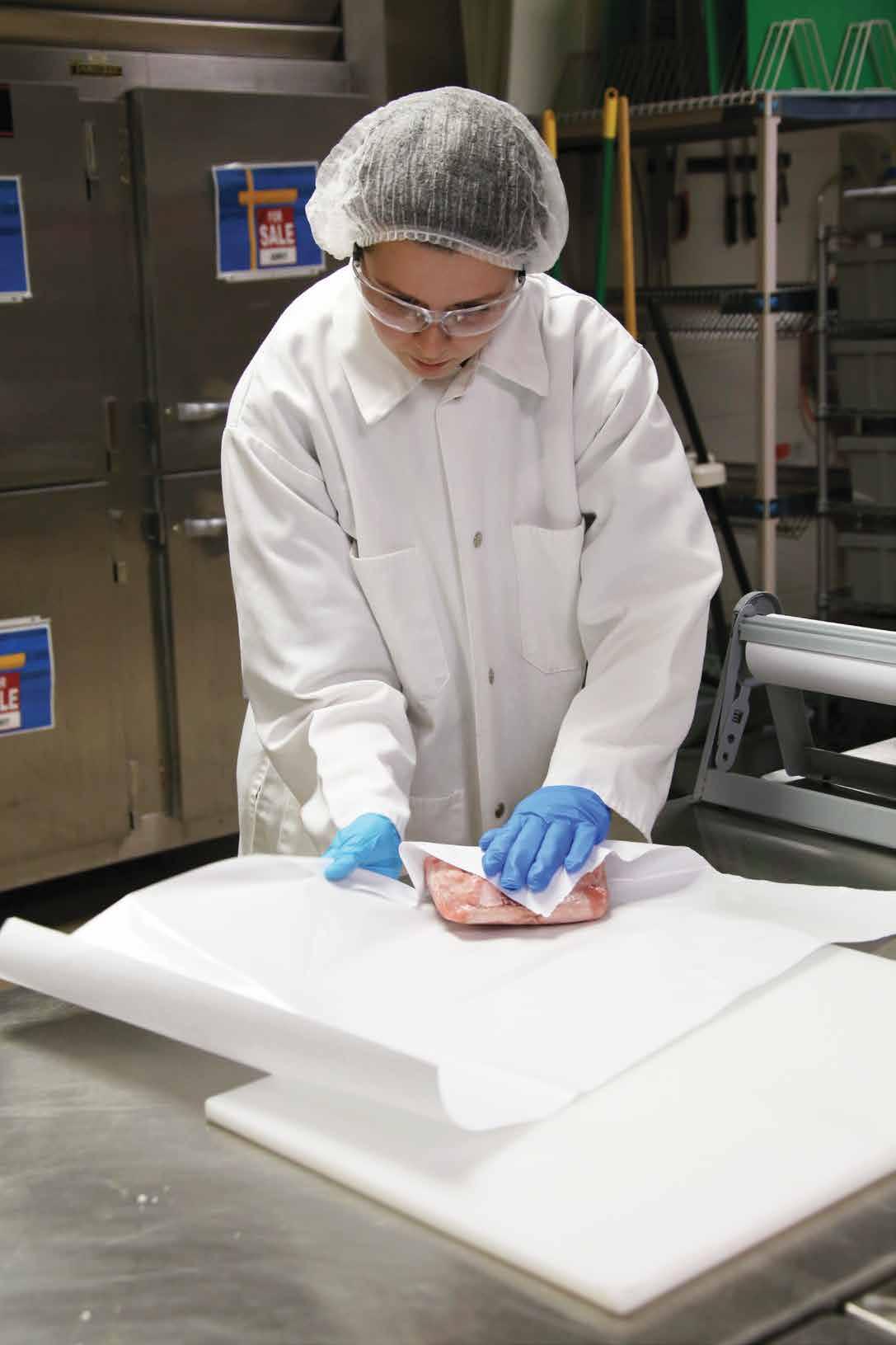


See what Texas FFA students have to say at mytexasffa.org
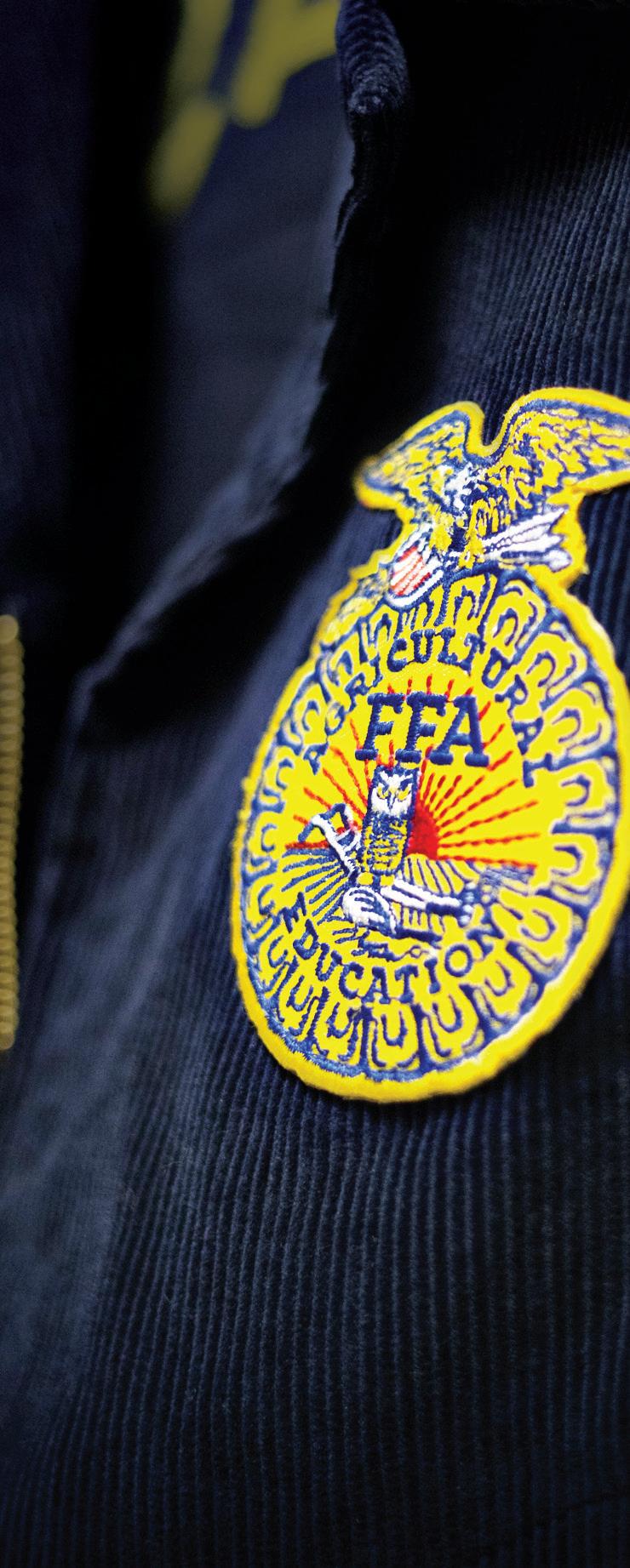
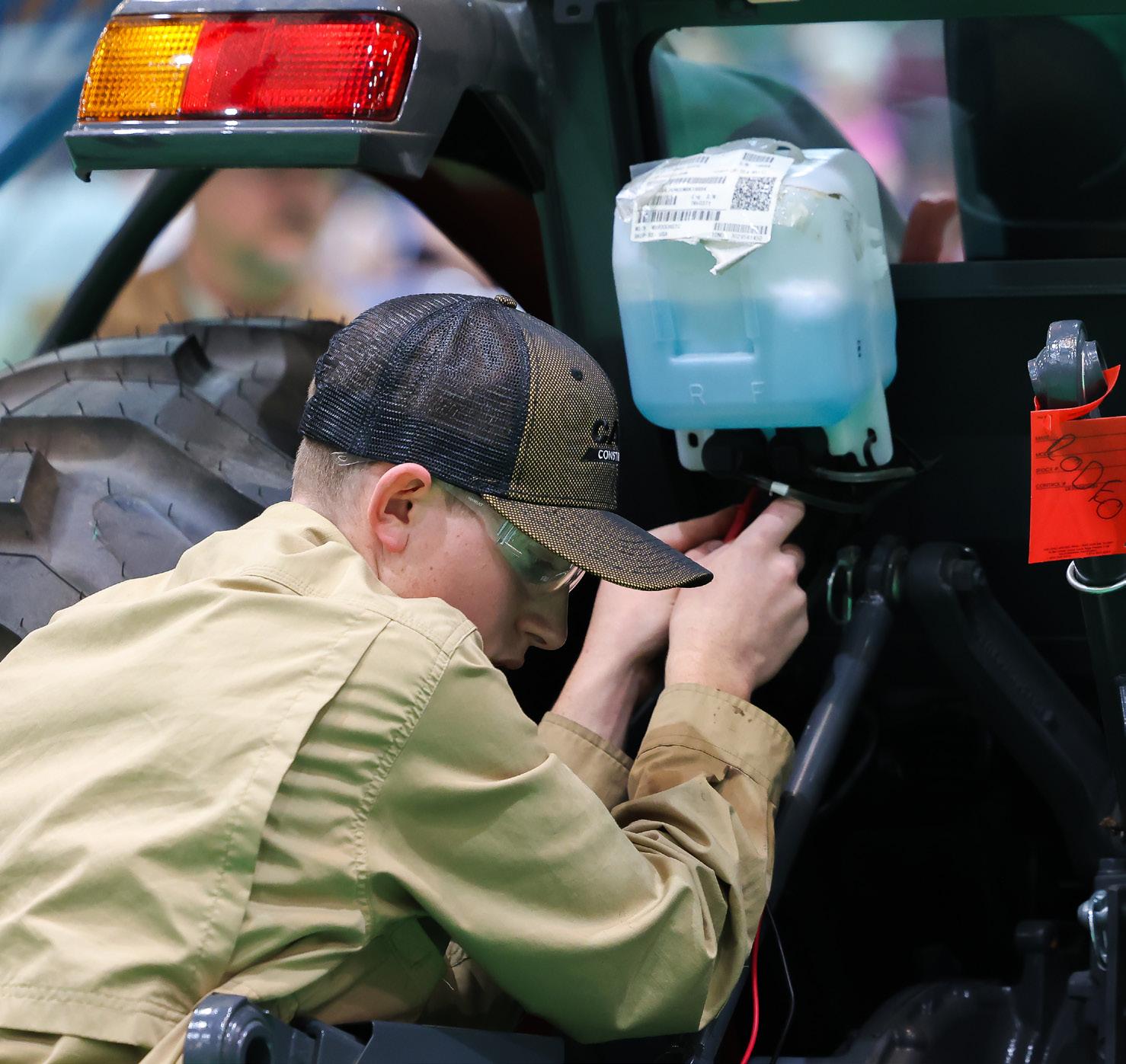
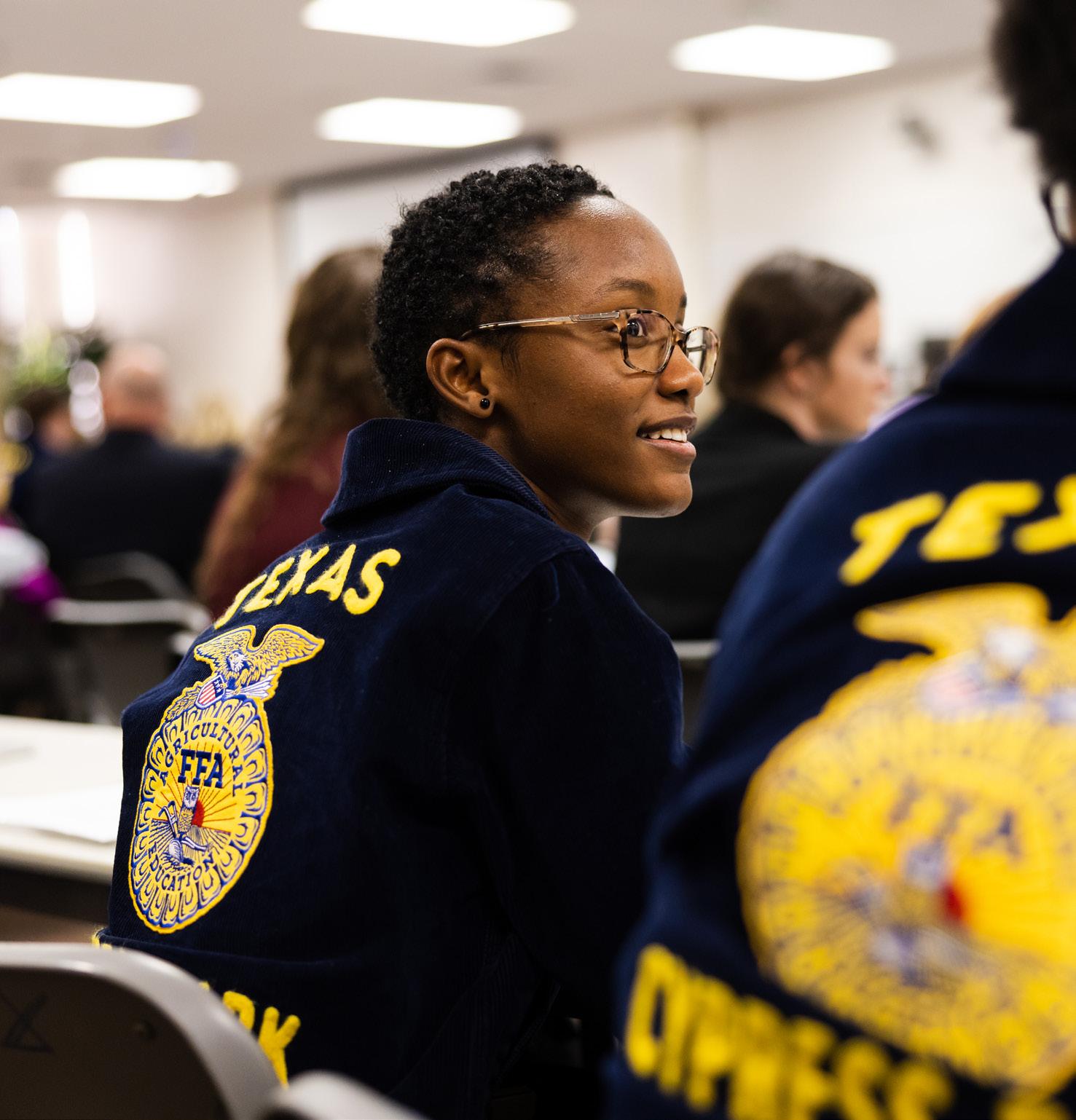
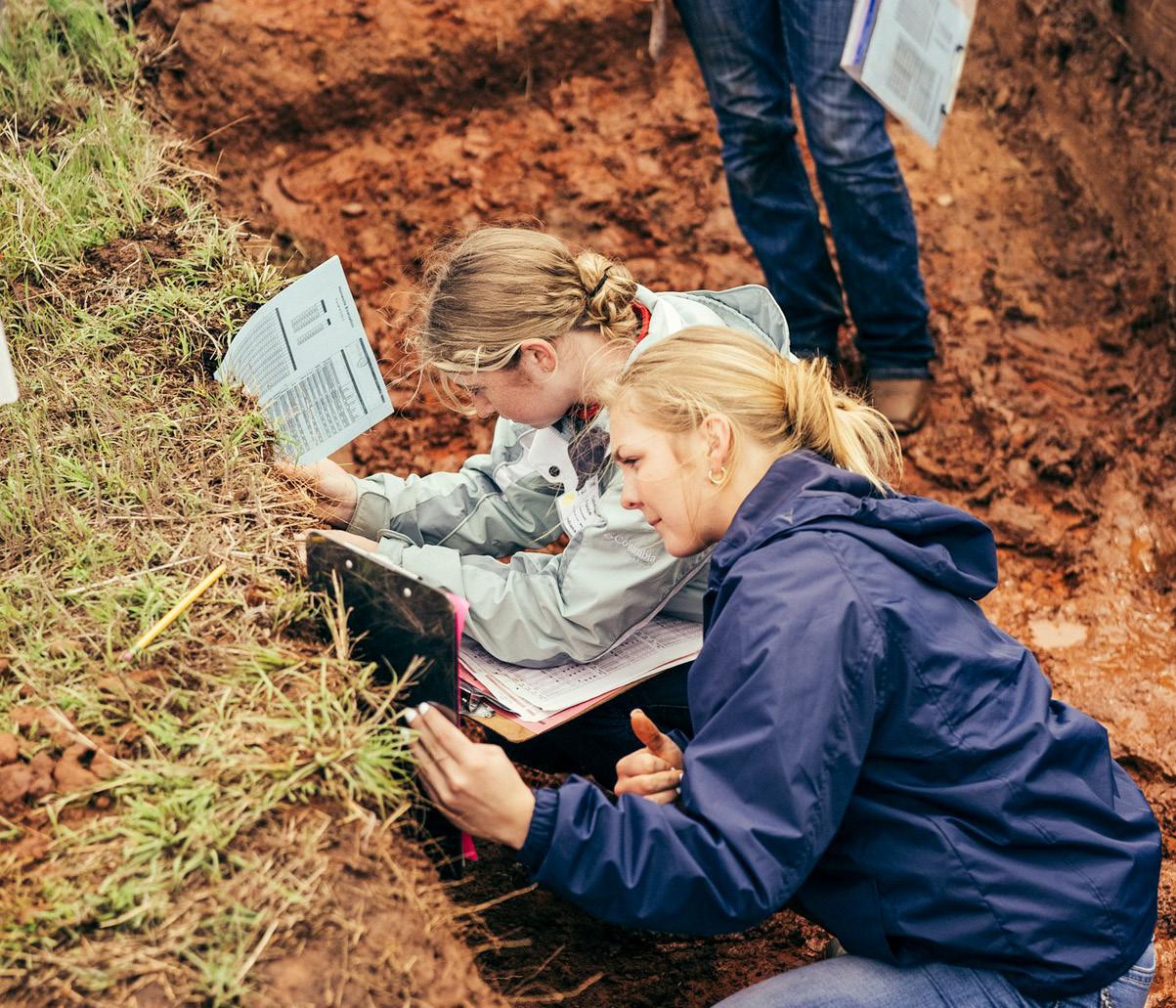

Lifelong learning and agriculture go hand in hand. We see and encourage that mentality through agricultural science education, both in the classroom and out.
Through our programs, students develop critical thinking and effective decision-making skills, foster teamwork and promote communication while learning the value agriculture plays in our lives.
Ultimately, we hope these students grow into adults continually seeking knowledge. This provides a foundation for those individuals to be agriculture advocates and informed members of society in all aspects of life.
We hope you enjoy the Summer 2023 issue of Growing Our Future!
JULY 24-28, 2023
 BY: WHIT H. WEEMS, ED.D. DIRECTOR OF ORGANIZATION, TEXAS FARM BUREAU
BY: WHIT H. WEEMS, ED.D. DIRECTOR OF ORGANIZATION, TEXAS FARM BUREAU
Iwas recently watching the 2023 Academy of Country Music Awards, and Lainey Wilson said something during her acceptance speech for Female Vocalist of the Year that really struck me. As a father of three young girls, I’m constantly striving to learn how to be a better parent and help guide them to grow up to be hard working, servant leaders, giving back to their community. As Lainey closed her speech that night, she said, “To all the little girls watching this, this right here stands for hard work. If you’re going to be a dreamer, you better be a doer.” Lifelong learning is really about doing.
Have you ever stopped and reflected on what it means to be a lifelong learner? I’ll be honest, I never thought much about it. Sure, I thought about learning in the sense of what was being
taught in my classes in high school or the skills I gained in college, but I never really thought about lifelong learning. So what is it? Lifelong learning is about developing skills and knowledge that can be applied to you personally and/or professionally. In some cases that may come from formal education, and in other cases, it is about informal education. At a very early age we start learning to do and doing to learn. Walk, talk, tie our shoes, brush our teeth. All things that just naturally happen as we grow up. Did you know there are even numerous learning theories that are based on learning to do and doing to learn? Don’t worry, I’m not going to get philosophical on you. The point is, learning through doing has been studied and shown that you learn better by practicing or doing. In fact, it is so important to FFA that the first six words of the motto focus on it. Learning to Do. Doing to Learn.
Of course, I have been learning my entire life, we all have. However, FFA was the turning point where I started realizing I was learning new skills, and those skills might just be used throughout the rest of my life. Bound to be a star athlete, injuries slowed me down (and maybe a slight lack of athleticism), so
“HOWEVER, FFA WAS THE TURNING POINT WHERE I STARTED REALIZING I WAS LEARNING NEW SKILLS, AND THOSE SKILLS MIGHT JUST BE USED THROUGHOUT THE REST OF MY LIFE.”
I turned my full attention towards FFA. I didn’t grow up in a full-time agriculture family, but we had livestock, a vegetable garden and lived in the country, so FFA seemed like a natural fit. As I became more involved, my SAEs began to grow, I started participating in LDEs and CDEs, and truly started learning the FFA way. Learning by doing. At that time, I didn’t know it would be a life changer for me. Still not truly understanding what it meant to be a lifelong learner, FFA provided me with a roadmap, sparking my interest and leaving me wanting to learn more. That spark fueled a passion, a passion that developed into a career. From the early beginnings as a County Extension Agent, to a College Professor and now the Director of Organization with Texas Farm Bureau, I get to live my passion each and every day. Along the way, I continue to learn so that I can advocate for agriculture, engage with consumers and producers and tell the amazing story of where our food, fiber and fuel comes from.
Now that I am older, I see learning, lifelong learning, from a completely different set of lenses. Today I can reflect on lessons learned. I’ve even come to realize that many of the skills I have today are because of great people who were put in my life. My parents, grandparents, ag teachers, employers, the list can go on and on. They all had an influence on my lifelong learning. Sometimes positive examples that led me to want to emulate them, other times it may have been something I was exposed to that made me want to take a different direction. Regardless, little did I know at the time, those actions would become valuable lessons that would stick with me for the rest of my life.
I take every opportunity I can to learn. Sometimes that’s intentional, sometimes
it just happens in the course of what we do. Circling back to where we started. I mentioned I was a father of three girls, and I have a lot to learn. I strive to be a good parent and provide them with what they need. Sometimes it’s as simple as a hug or emotional support, and other times it’s providing guidance or redirection. Parenting is definitely an example of lifelong learning. The hard part is sometimes you get it right, and sometimes you make mistakes. That’s alright. It happens to all of us regardless of what we are involved in. The key is to embrace learning and put what you learn into action. If you don’t get it right, don’t give up, try it again. Learning to do is just the first step, doing to learn is the second step, and putting it all together is life. As you continue to grow both personally and professionally, I challenge you to think about the following:
• Never be afraid to try something new
• Seek your interest/Find your passion
• Surround yourself with positive influences
• Always ask questions
• Practice and Implement (Doing to Learn)
• Don’t be afraid to start over
We are all lifelong learners. Oftentimes, we may not realize it, but everything we do revolves around learning. It’s what you do with it that really matters. Learn to do, do to learn. Find your passion and dream big. I agree with Lainey, it just might be time to start being a doer. It will last a lifetime!
Dr. Weems serves as the Director of Organization with Texas Farm Bureau, the largest general farm organization in Texas that represents the interests of agricultural producers and rural communities across Texas. In this role, he oversees the leadership development, educational outreach, youth outreach and urban outreach departments. Weems received his B.S. in Agricultural Services and Development and M.S. in Ag Education from Tarleton State University, along with a Doctor of Education from Texas A&M University and Texas Tech University. He is a former Texas FFA member and currently serves as an industry representative on the Texas FFA Board of Directors.
“I TAKE EVERY OPPORTUNITY I CAN TO LEARN. SOMETIMES THAT’S INTENTIONAL, SOMETIMES IT JUST HAPPENS IN THE COURSE OF WHAT WE DO.”
Agricultural science education prides itself on real-world learning. Millions of Supervised Agricultural Experiences have been successfully completed over the Texas FFA’s 95-year history. Providing students with hands-on learning and personal growth.
Taking a family and a personal passion, and utilizing the skills acquired through the agricultural science education experience to cultivate a fruitful long-term agriculture business, is just one excellent example of the ideal. Kendra Elder, a former Whitney FFA member, did just that.
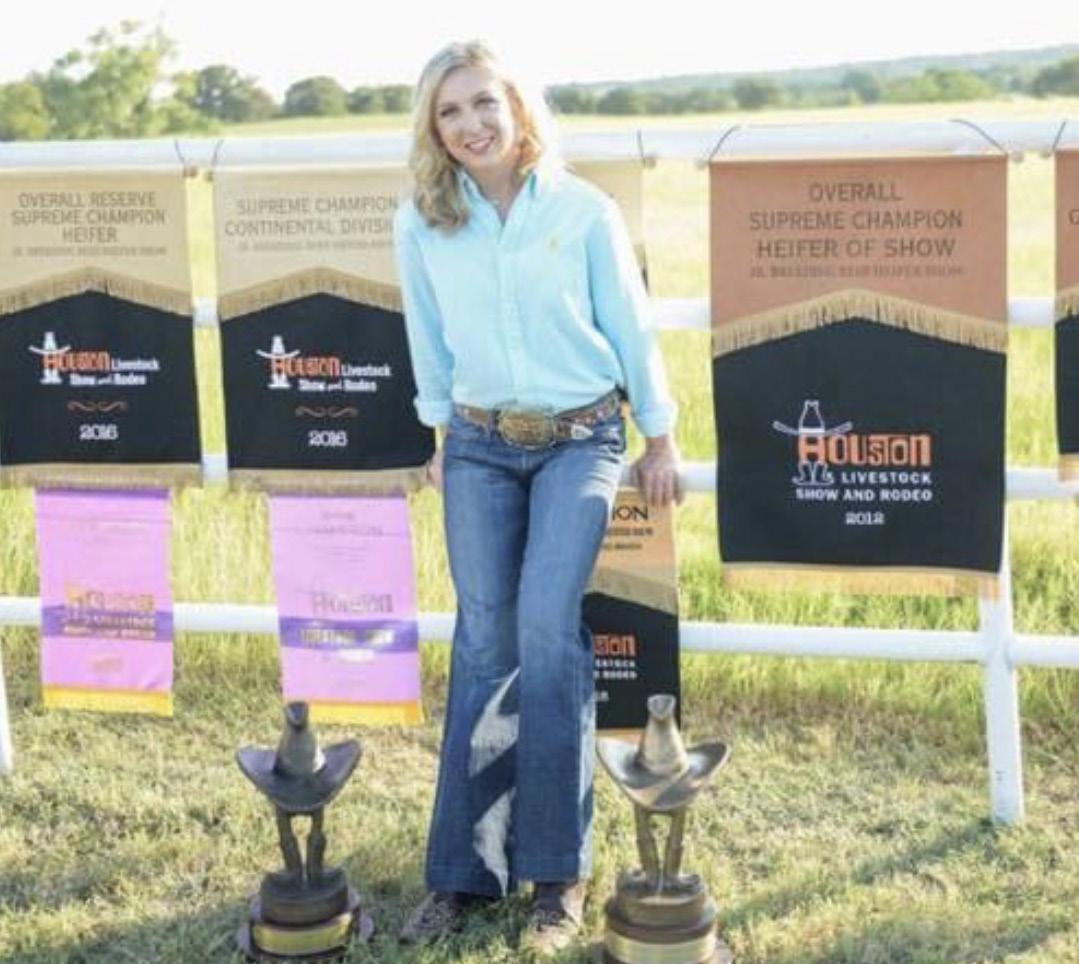
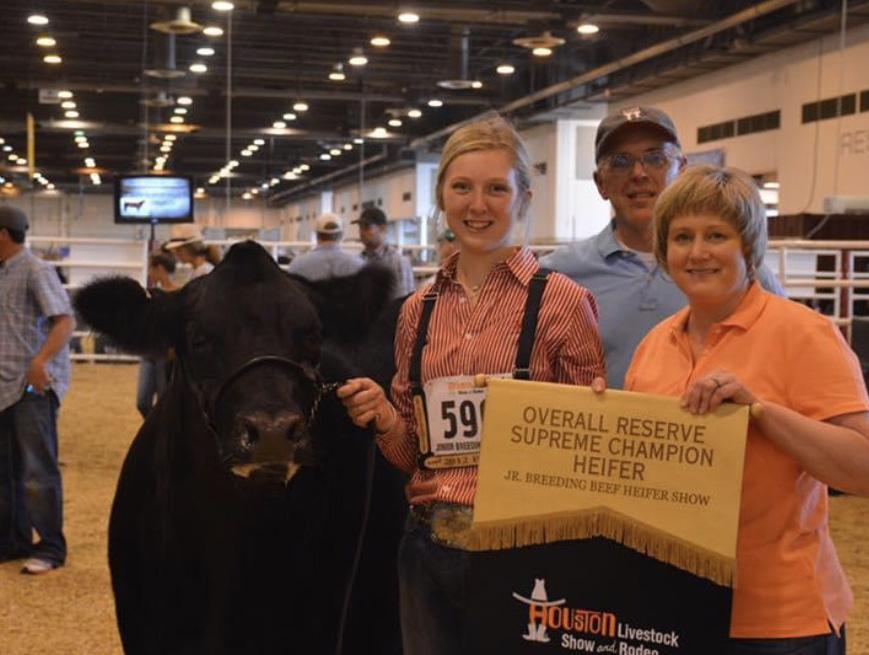
“The work ethic, drive, and leadership opportunities that were presented to me as an FFA member were endless,” said Elder. “I knew that
I wanted this business to be long-term with my family. The agriculture industry has impacted my life so much.”
Elder is a third-generation cattle rancher that grew up on a cow-calf operation. After watching her older brother, Dillon, begin showing as a junior FFA member, she felt she couldn’t wait to be involved. She was able to talk her dad into bringing up a young calf, that was recently weaned, to allow her to have a project to work on.
“My start began at age five with my first bucket calf heifer, Claire,” said Elder. “At a young age, I gained a true love for raising purebred Charolais cattle with my family.”
When she was of age and was eligible to show under the junior FFA program herself, she purchased her first official show heifer named Jewel, a Charolais composite heifer.
“I prepared all summer for the American Charolais Junior National Show,” said Elder. “I worked on Jewel each day, learned proper showmanship techniques, rinsed and washed, and even recited my prepared speech for the leadership contests.”
That first heifer would ultimately jump-start years of personal growth and a business for the young agriculturalist.
As the years passed, she fell in love with the livestock industry. When she was 12 years old, she and her family raised what she considers the “ultimate start to her SAE project.” A heifer named Pearl, who was out of that first show heifer.
“My family and I were a team,” said Elder. “I learned about proper nutrition and spent many hours cultivating a plan to be successful. I put every ounce of blood, sweat, and tears into that heifer.”
The hard work paid off when that project went on to win multiple titles, including Supreme Champion Female at the Houston Livestock Show and Rodeo and Supreme Champion Female at Rodeo Austin.
“This one cow completely changed the outlook on our herd and has made a huge impact on the longevity of our business.”
This includes the cultivation of her high school Supervised Agricultural Experience (SAE) through the continuation of Elder Cattle Company.
“The decision on what my SAE would be was easy,” said Elder. “Some would say it was a given, but I see it as a lot of hard work by my family to make sure their children could inherit a successful program.”
She states that she loved learning about all aspects of the business from breeding decisions, vaccinations, nutrition, environmental conditions, calving season, halter breaking, and marketing of the animals.
“The industry impacted my life so much and I saw a future continuing to raise purebred cattle,” said Elder. “The drive and adrenaline did not go away for me after finishing showing livestock through FFA.”
She states that the goal for Elder Cattle Company is for their females to produce successful offspring that serve as attributes to other cattle herds or are successful in the market ring at stock shows across the country. They focus on maternal qualities such as herd performance, udder quality, good-footed females, and overall longevity in the production pen.
“My dad and I make breeding decisions to make sure we are meeting our overall goal for our herd,” said Elder. “In the last years, we have been keeping our heifers to improve our fast-growing cow herd, market and selling our club
“THE WORK ETHIC, DRIVE, AND LEADERSHIP OPPORTUNITIES THAT WERE PRESENTED TO ME AS AN FFA MEMBER WERE ENDLESS.”
“I KNEW THAT I WANTED THIS BUSINESS TO BE LONGTERM WITH MY FAMILY. THE AGRICULTURE INDUSTRY HAS IMPACTED MY LIFE SO MUCH.”
calf steers, and have sold Charolais bulls to breeders across the country.”
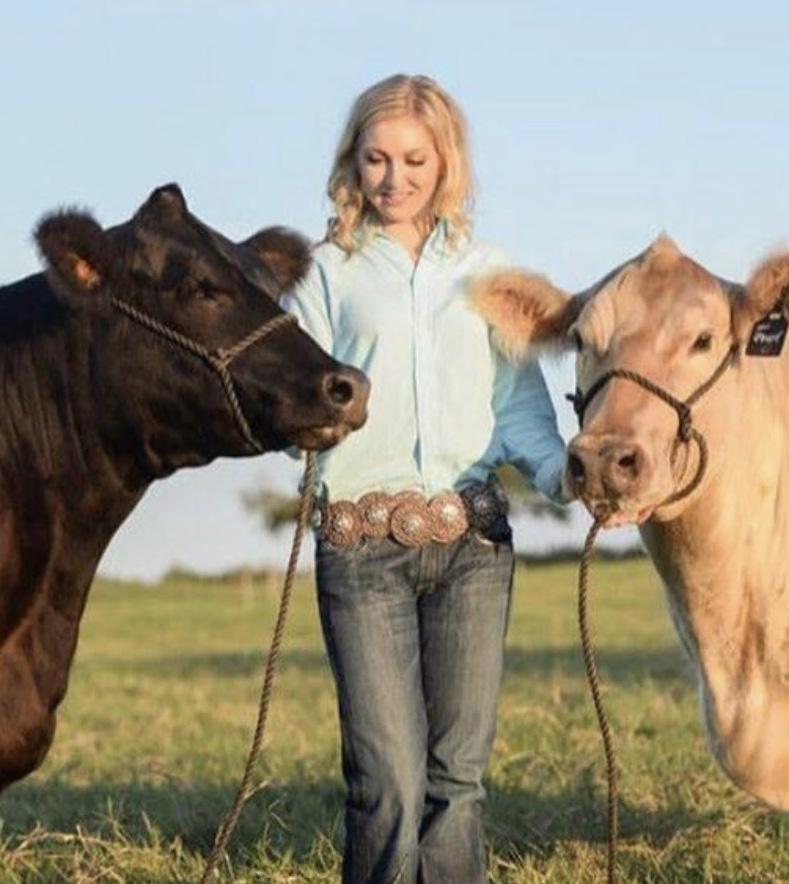


















She credits her family and ag teachers, Brad and Missy Coffelt, for their crucial role in her ag education journey.
Elder also credits her FFA experience, which also included LDEs, CDEs, and leadership positions, with helping her get to where she is today in her career. In addition to her agribusiness, she is an event planner for Will Rogers Memorial Center in Fort Worth, Texas.
“Life is full circle,” said Elder. “I was eight years old, wandering the streets of Will Rogers Memorial Center at the Fort Worth Stock Show and Rodeo, curious about what I would do as I got older. Now I am here.”





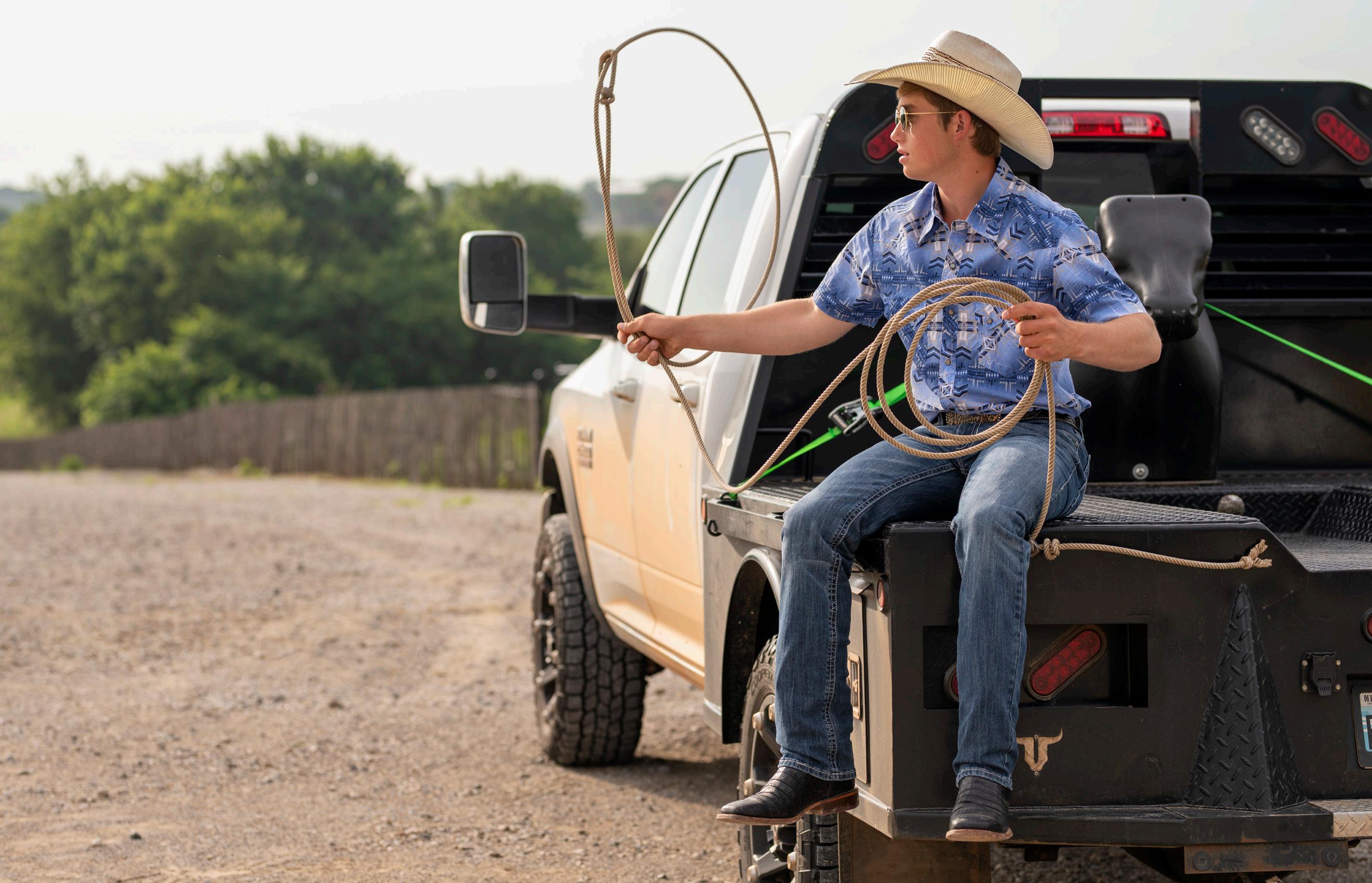

The legacy of a successful family production agriculture operation provides a destined career path for Logan Maddox and his Supervised Agricultural Experience (SAE).
"Maddox Farms consists of 3,000 acres of cropland in which 2,400 acres are planted for row crops, and 600 acres are utilized for hay production," said Maddox. "The row crops produced include cotton, corn, soybeans, wheat, and milo. The hay crops consist of coastal and sudan."
The farm is an operation that has been in his family for multiple generations. He believes that he is blessed to have the opportunity to continue the farming tradition as part of his legacy.
"My employment requires me to plow fields, aid in planting crops, and run combines and grain carts during harvest season," said Maddox. "I operate hay equipment, including the baler and rake, spray
pesticides, apply fertilizers, and perform equipment maintenance and repairs as needed."
As the Dawson FFA member got older, he became more independent and proficient in using the provided farm equipment.
"My position has required me to become proficient in using various technologies," said Maddox. "This includes the GPS in each of the tractors, the use of a phone application that allows me to determine the tractor's location in the fields, and drones used to assess damage to crops caused by extreme weather conditions and feral hogs."
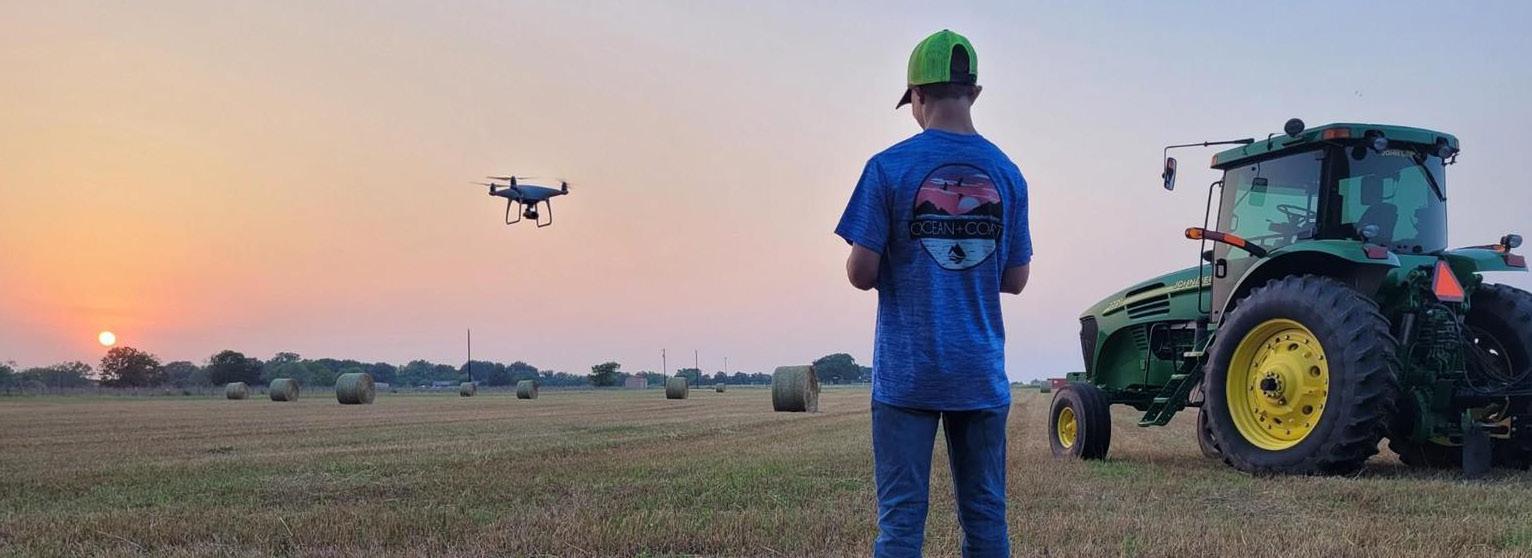
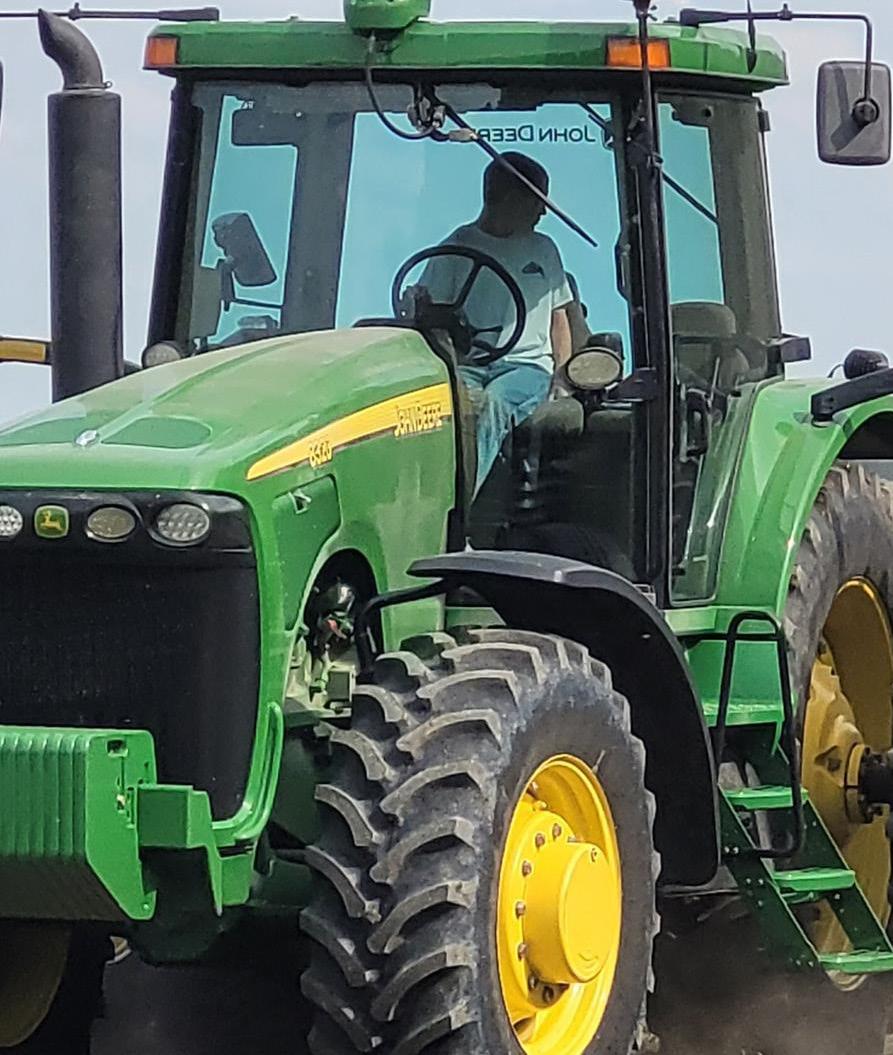
His unpaid employment enables him to exchange labor for facilities for his market animal SAEs. More notably, it provides the needed experience for managing the operation he one day seeks to join as a part-owner.
"By allowing me to gain experience in operation from such a young age, my family is equipping me with the tools to continue this tradition for years to come," said Maddox.
Maddox's successful SAE project was recognized as the Star Greenhand in Placement at the 2022 Texas FFA State Convention.
THE TEXAS FFA ASSOCIATION IS EXCITED TO PARTNER WITH LAKE HIGHLANDS COMMUNITY GARDEN FOR OUR ANNUAL CONVENTION SERVICE PROJECT. CHAPTERS ARE ENCOURAGED TO BRING SEED PACKETS TO THE TEXAS FFA CONVENTION ON JULY 10-14, 2023.
ORGANIC
TOMATOES
LETTUCE
COLLARDS
KALE
SPINACH

OREGANO
BEE BALM
BASIL
DILL
CILANTRO
ENGLISH PEAS
SOUTHERN PEAS
SNAP BEANS
POLE BEANS
CUCUMBERS
THYME
SAGE
ROSEMARY
PARSLEY
EGGPLANT
OKRA
CARROTS
BEETS
TURNIPS
POTATOES
JICAMA
ONIONS
TRAILER PROVIDED BY ARLINGTON FFA
LET’S STOCK THE STOCK TRAILER! ALL DONATIONS CAN BE DROPPED OFF IN THE EXHIBIT HALL.
END OF YEAR WRAP UP AND WIND DOWN
BY: TRAYLOR LENZ, ANGLETONAs we approach the end of the school year, it is a great time to both reflect on the past year and prepare for success in the year ahead.
1. Look back to see what worked in your classroom and what didn’t work as well as you hoped. How can we make those learning opportunities better for future students?
2. Think about the activities your chapter participated in and assess if you want to change any of those activities. You may end up dropping some events or adding better activities.
3. Take time to inventory your shop, greenhouse, barn, etc. and see what supplies need to be replaced.
4. Before the business office staff leaves for summer, get all bills paid and book summer travel.
5. Look into summer workshops and participate in state degree check to help your area evaluate degrees, etc.
6. Make sure your administrators have your plans for summer work days and FFA activities. Sending a reminder to parents and students about procedures and expectations can hopefully reduce stress.
7. Visit with your validation committee members to plan for the validations that take place over the summer. It is also a good time to visit with parents and students who will have projects on feed over the summer to make a plan on project visits.
I hope you had a great year and that you will find time to recharge over the summer for another successful year.
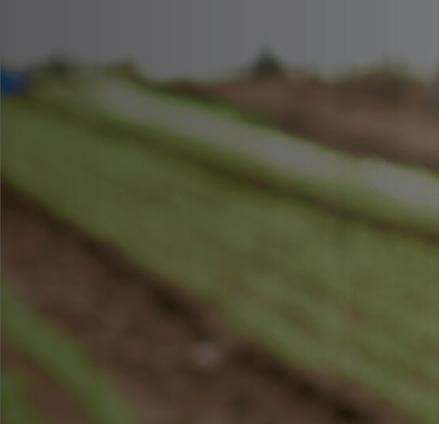

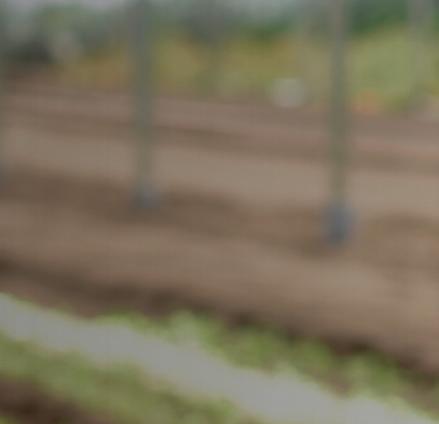


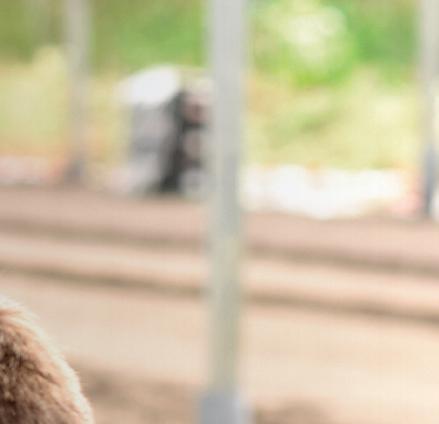
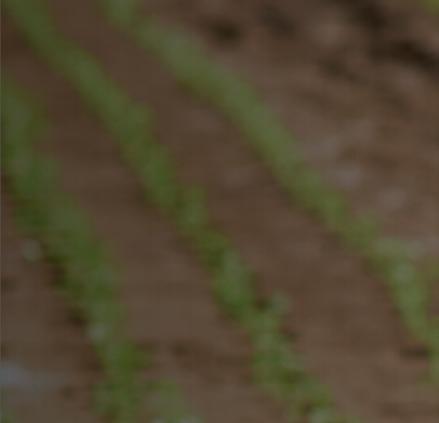

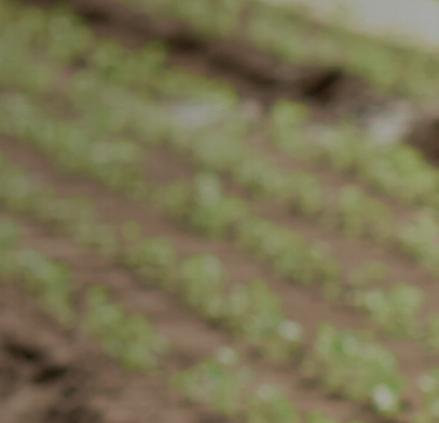
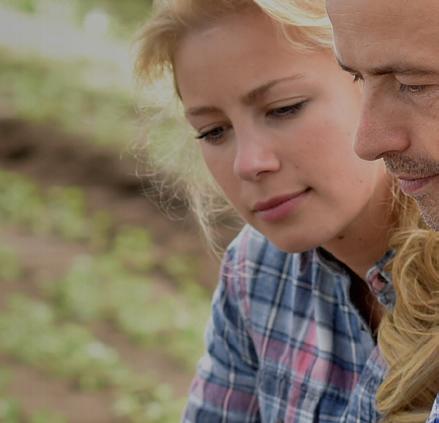
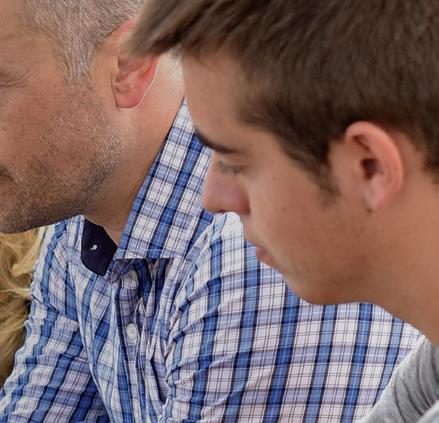

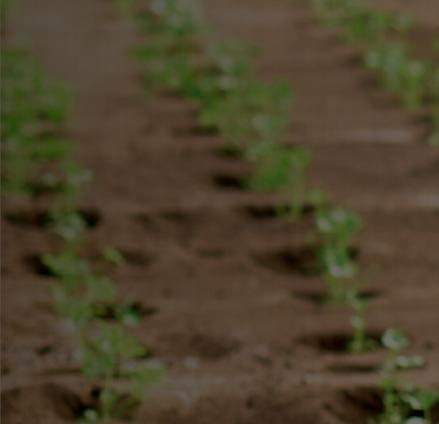





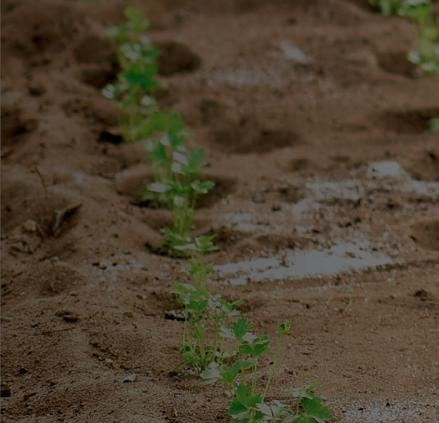
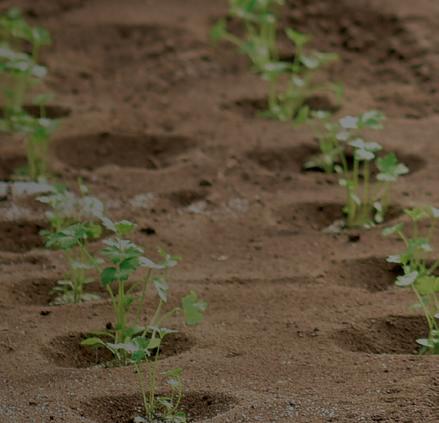
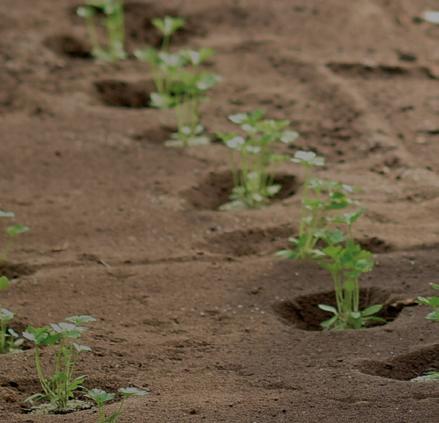
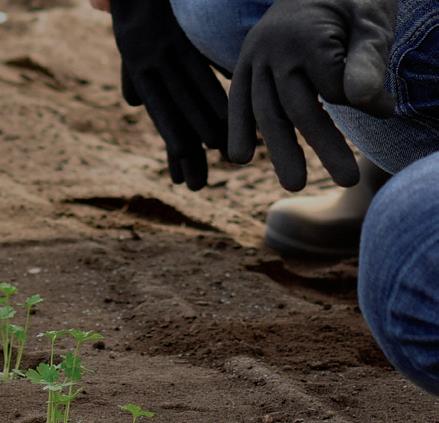



"I wrote #AgTeacherLife during the LDE season of last year in response to one of my co-teachers commenting on one of the long days we'd had with practices. She chimed in, "#AgTeacherLife," like we always do during times outside regular school hours, working with teams and projects. I had the demo made earlier this year with a studio band and am recording my version this summer."

"Like any teacher, we all have those times when we feel worn down and discouraged. I hope that when other teachers hear this, it's a little reminder that they are making a difference to their students and the teachers around them, and that they are appreciated."
SOME MIGHT SAY I CHOSE THIS LIFE, BUT THIS LIFE IT CHOSE ME WHAT GETS ME OUT OF BED EACH DAY IS BEING WHAT I WAS BORN TO BE THIS JOB AIN’T ALWAYS EASY, BUT THOSE KIDS ARE WORTH MY TIME THIS IS THE PATH I’M ON #AGTEACHERLIFE
IT’S BEING THERE TO BUILD THEM UP AND GIVE THEM WHAT THEY NEED AND WORKING WITH THEIR MOM’S AND DAD’S TO HELP THEM ALL SUCCEED IT’S STOCK SHOW TRIPS AT FIVE AM, WORKING AT THE SHOP AT NIGHT THIS IS THE PATH I’M ON #AGTEACHERLIFE
I DON’T DO IT FOR THE MONEY; I DON’T DO IT FOR THE PAY I TEACH THOSE KIDS THE ROAD TO SUCCESS DON’T ALWAYS LOOK THE SAME IT’S CONTEST TRIPS AT 3 AM, WORKING AT THE BARN AT NIGHT THIS IS THE PATH I’M ON #AGTEACHERLIFE
I TRY TO LEARN WHAT I CAN FROM THE ONES WHO CAME BEFORE SO MUCH WISDOM AND TRADITION PASSED DOWN TO ME AND MANY MORE THEY’RE MY BROTHERS AND MY SISTERS, AND WE ALL WALK THAT LINE THIS IS THE PATH WE’RE ON #AGTEACHERLIFE
WE DON’T DO IT FOR THE MONEY; WE DON’T DO IT FOR THE PAY WE TEACH THOSE KIDS THE PATH TO SUCCESS DON’T ALWAYS LOOK THE SAME
IT’S CONTEST TRIPS AT THREE AM, WORKING AT THE BARN AT NIGHT THIS IS THE PATH WE’RE ON #AGTEACHERLIFE
SOME MIGHT SAY I CHOSE THIS LIFE, BUT THIS LIFE IT CHOSE ME…
"I DIDN'T CHOOSE THE AG TEACHER LIFE; IT CHOSE ME."MUSIC AND LYRICS BY SHAWN REJCEK, WACO MIDWAY HIGH SCHOOL AGRICULTURE SCIENCE TEACHER
For Kennedi Elmore, raising her own food is rooted in a family history. This in turn has cultivated a successful Supervised Agricultural Experience (SAE).
"My agribusiness operates under the name "The Vintage Kitchen," through which I market and sell processed pasture-raised chickens and grass-fed ground beef."
The Quitman FFA member started "The Vintage Kitchen" after noticing the positive feedback her family received from others that ate meat from their farm.
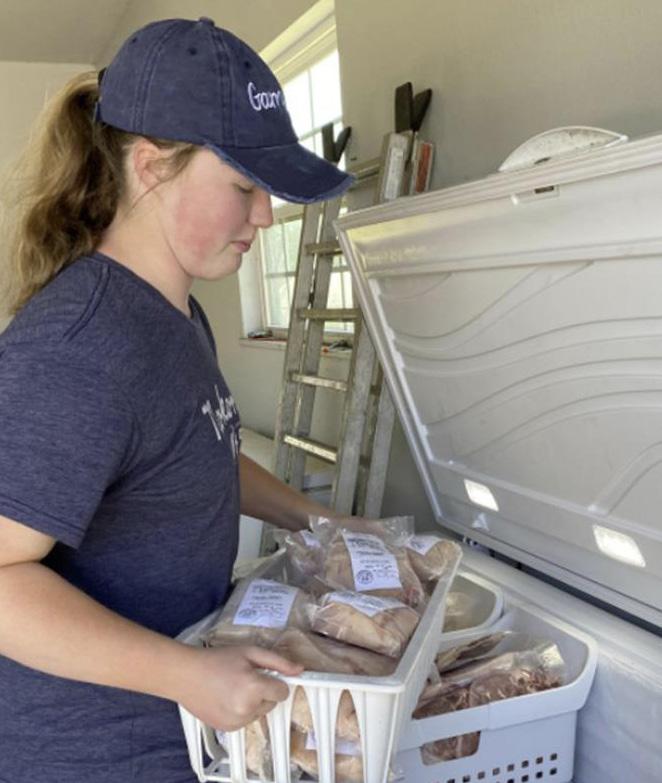
“I purchase the broilers when they are ready for processing, using my poultry production enterprise as the source of birds, “said Elmore. “The addition of ground beef was made in 2021 when I purchased two grass-finished steer calves and had them processed into hamburger meat to sell by the pound.”
She states that her greatest challenge is customer education and awareness of the pasture-raised meat industry.
“In general, consumers do not understand the differences between my pasture-raised grass-fed products and those purchased at a retail grocery store,” said Elmore. “They often confuse pasture-raised with organic labeling.

However, there are many differences, such as the conditions in which the animals are raised, the diversity of the animal's diet when pasture-raised versus a concentrated animal feeding operation, and the overall quality of the final product.”
However, she believes that dispelling marketing myths that consumers are bombarded with by the commercial meat industry is part of educating her customer base and a constructive outcome from her business efforts.
Elmore's successful SAE project was recognized as the Star Lone Star in Agribusiness at the 2022 Texas FFA State Convention.
The Texas Legislature convened this year starting January 10, 2023, and will officially end May 29. The legislature meets every odd year for 140 days. If the governor feels a need or wants something addressed, they may call a special session in which legislators will only work on the items named by the governor. This year, all bills had to be filed by March 10. Over 8000 bills were filed this year between both houses, up from the 2021 session.

Each representative or senator may file a bill. Once filed, it must be read on the house floor and then assigned to a committee. Many times identical bills are filed to help give them a good chance at moving through the system. It also helps if the bill
has a companion on the other side of the legislature since it shows support from both sides. After that step, the committee chairman chooses which will get a hearing. With so many bills filed, there is no way they all will be heard in a committee. Many bills die this way as they can't get back to the chambers to be considered for adoption.
When a bill gets assigned a hearing, the public can provide testimony after the author lays out the bill to the committee. The author may also bring in invited testimony to support their bill. As an example, when Senate Bill 8 and others related to educational savings accounts were assigned, 387 signed up to speak. Even more recently, I signed up to speak on a Senate bill in April. Testimony can also go way into the morning hours so all have a chance to be heard.
After a bill is heard, it is left pending until the committee decides to vote on it. A committee may vote not to send it back to the floor or even leave it pending, where it can die in the committee. After it passes out of the committee, it returns to the proper chamber and is reread for the second time. Debate, discussion, and amendments can be offered at this
time. This session, HB2 has over 300 amendments that were presented. Some amendments may not get heard if they are not friendly to the bill's author. A vote is taken at that time, and then on another calendar, it must be voted upon after the third reading. If it passes at that time, it will then be sent to the opposite chamber.
Once the opposite chamber receives it, it must go through the same process and be assigned to a committee where it could also die in that committee. They can also recommend changes to the bill that can be brought back to that chamber's floor for consideration. If the bills passed do not match, they must go to a joint committee to work out details. If details are worked out, then it is sent back to both chambers to approve and then sent to the governor for approval, or he has the option of vetoing the bill.
There are many ways you can get involved. You can reach out by phone or email to any of the staff or the legislators in your local district or their capitol office. All staffers talk, and when you tell them what bill you are referencing, they will connect you with the staffer involved. You can watch what is happening at the Texas legislature Online at capitol.texas.gov. You can look up bills, create a bill list, and sign up for bill movement emails and committee or calendar notices. You can also use this to watch committee hearings and House and Senate floor sessions. You can also visit the capitol and visit with them in the office and testify on bills at a committee meeting. Watching who comes out to testify for and against bills is entertaining. If your association sends emails as a call to action, take the time to call or email. They want to hear from their constituents.
You can also keep watch by following groups such as Friends for Public Edu-
cation, Raise Your Hand Texas, Texas for Strong Public Education, Texans for Public Education, and Friends of Texas Public Education. All of these have email servers, and they send out emails weekly. You can also follow legislators on email and social media, and they will send weekly updates to those signed up for their emails.
Overall this session, both chambers, and the governor had their own priorities. The big issues affecting our members were school funding, school safety, teacher retention, and teacher pay. The only bill, by rule, that each chamber must pass is a budget bill. HB1 is the general appropriations bill passed by the House, and the Senate has made a substitute, meaning it will go to a conference committee. It does not increase the basic allotment by much. Many thought this might be how the groups would address teacher pay raises.
The Senate has recommended $2,000 in general, and smaller school teachers may receive an additional $4,000. The House proposed $3,800. Other bills were filed, which looked at adding even more for pay raises. It remains in the hands of the legislature to make this decision.
Another bill was filed to increase the direct fund number for CTE funding from 55 to 65 percent, but it was not heard in committee. HB100 was heard in committee and originally changed weighted funding, took out the full-time equivalent, and changed it from average daily attendance to average enrollment. ATAT and CTAT worked to fix this section to retain the FTE statements. An amendment will be offered to keep current funding as is in current law. This bill was modified by the Senate and removed the parts related to school funding and CTE funding was not touched. It remains
to be seen what will happen with this bill.
School vouchers or educational savings accounts were a big, pressing issue. Both chambers heard lengthy testimony. Proponents of the bill relied on parent choice or parental empowerment. The Senate and House differed on the amounts to spend, but both were very large sums of money from other revenue sources and not current education funds. Most against vouchers say that money should be used to improve public schools.
A few other bills include some teacher recruitment money as well as internships. The current status of those bills is still in question. Various bills also consider school safety, including a few related to guns. A bill was heard
on April 20, creating a foundation and trade diploma; it was previously referred to as a vocational high school diploma. Many aspects of the bill are not feasible and make it undesirable for a school to offer it or for a student to go down its path. It was later killed on the House floor.
The legislature has a lot to accomplish in its last days. As of the writing of this article, only a few bills have been passed by both sides. With many items left, it will take a lot of work for both chambers to complete their major priorities before the end of the session on May 29. Since this article was written before the end of the session, some of this information will not be current. Please call me if you have any questions.

Charleigh Feuerbacher's agriculture research involving hydroponically grown plants cultivates a foundation for her long-term Supervised Agricultural Experience.
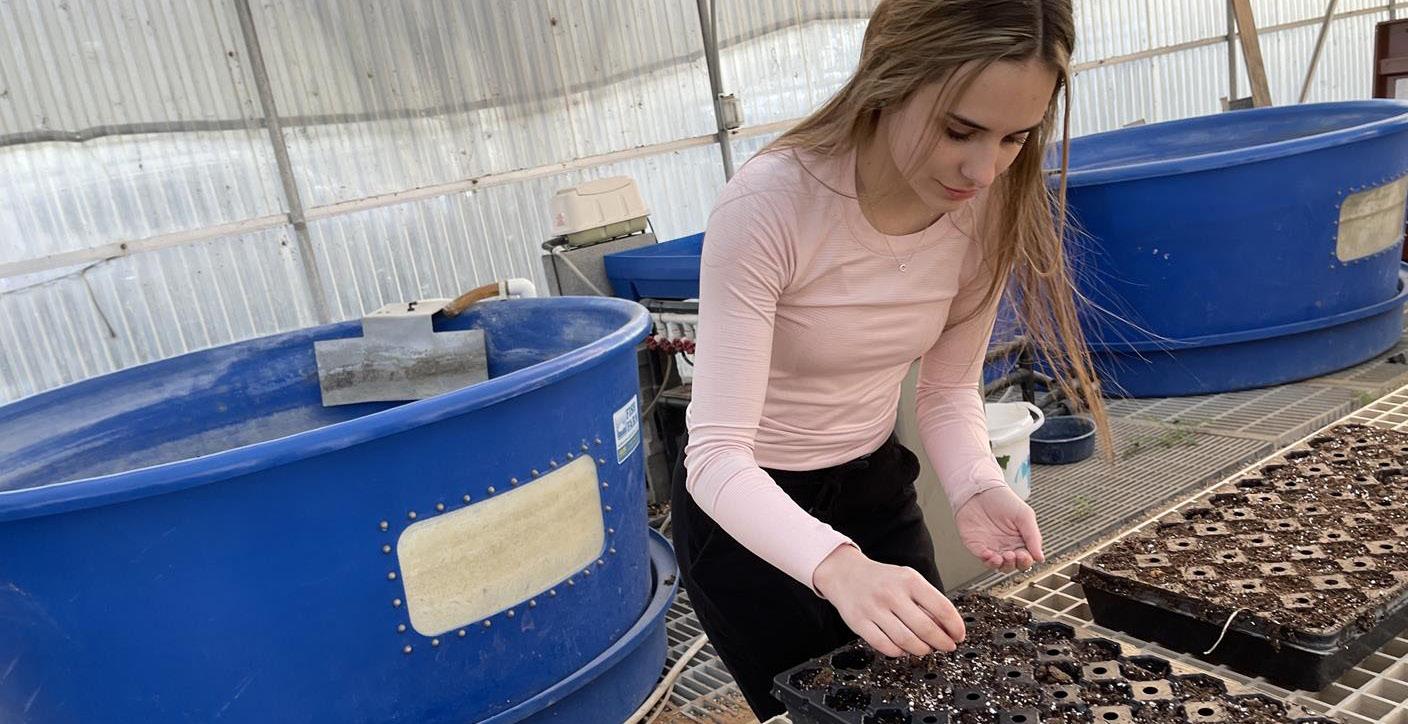
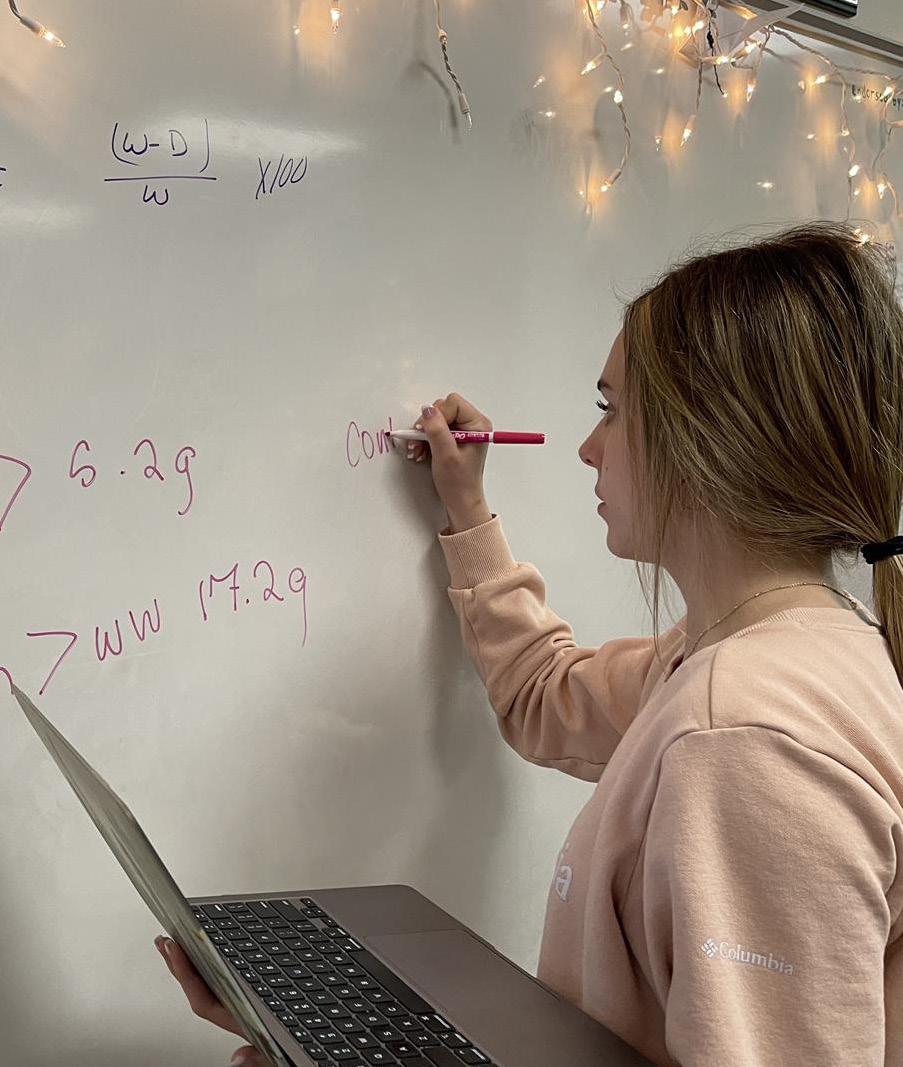
"My first project focused on the nutrient additive of different sugar types across the sweet potato, cilantro, and tomato plant groups," said Feuerbacher. "I conducted this research project to find the most efficient sugar additive in hydroponically grown plants."
The Stephenville FFA member explains that this project significantly impacts agriculture as it could be a viable solution to the growing urban sprawl and food insecurity in urban areas.
"My second project focused on growing hydroponically grown plants as well, with the nutrient additive of ascorbic acids present in hydroponics systems with the goal of having crops grown with higher vitamin C content," said Feuerbacher. "Finding a solution to produce crops which are abundant in vitamin C can be very beneficial to increasing overall health in America."
This study could heavily impact the future of agriculture as a productive solution that can feed poverty-stricken Americans and offer an additional nutrient source.
"When conducting my research, I used the empirical method to form a thorough literature review, test hypotheses, organize variables, collect data and perform a statistical analysis," said Feuerbacher. "My ambition for this research is to advance the way we produce diversely and hydroponically grown produce."
The Stephenville FFA member collaborated with Dr. Cummings of Tarleton State University, who offered knowledge of hydroponics and advice throughout the project.
"I went to a hydroponics camp at Tarleton State University to further my knowledge," said Feuerbacher. "By gaining a broad background knowledge in the field I became much more confident in my SAE."
She believes the skill set she has gained through her project will be an impactful advantage in her future profession.
Feuerbacher's successful SAE project was recognized as the Star Chapter in Agriscience at the 2022 Texas FFA State Convention.
"BECAUSE I'M HIS DAUGHTER AND HIS TEACHING PARTNER, I HAVE SEEN THE INCREDIBLE AMOUNT OF TIME HE PUTS IN. HE HAS BEEN AN OUTSTANDING ROLE MODEL FOR YEARS IN OUR COMMUNITY AND HAS BEEN A MENTOR TO HUNDREDS OF STUDENTS AND COLLEGIATE STUDENT TEACHERS. "
WHEN
"Having my dad as my ag teacher for all those years was a blessing. His guidance as a mentor never stopped when I went to college, and now teaching with him at Pioneer High School is so unique. Many ag teachers' kids end up teaching, and I think it is because of how much of the program we were exposed to growing up." - SIDNEY (DAUGHTER)
YOUR CHILD NOW TEACHES AG AFTER WATCHING YOUR CAREER; HOW DOES THAT FEEL?
"Ag education and the FFA together are the most positive program in which a student can become involved. It is very rewarding. As a teacher, I now have 11 former students who have become ag teachers, including my daughter. I am proud of all my students, but having my daughter follow in my footsteps is priceless. What is even more rewarding is seeing her excel at her job. As an ag teacher, you have the opportunity to affect so many students' lives positively. Seeing her do that exact thing is awesome!" - JOE (FATHER)
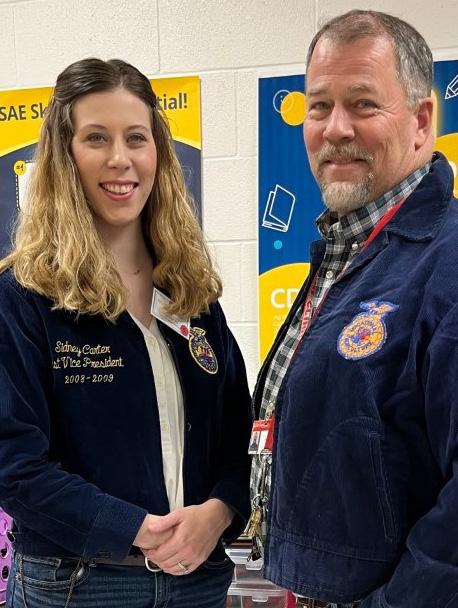
OF FFA AND AG EDUCATION?
"Being an ag teachers kid, you really grow up with a huge extended family. My other ag teachers were like bonus parents, and the other FFA members were like cousins. Being an ag teacher is no different. This organization brings people together because of the large time commitment the students and their parents put in. Long hours on the road to contests and being at livestock shows year after year give you much time to get to know each other. There isn't another organization like this." - SIDNEY (DAUGHTER)


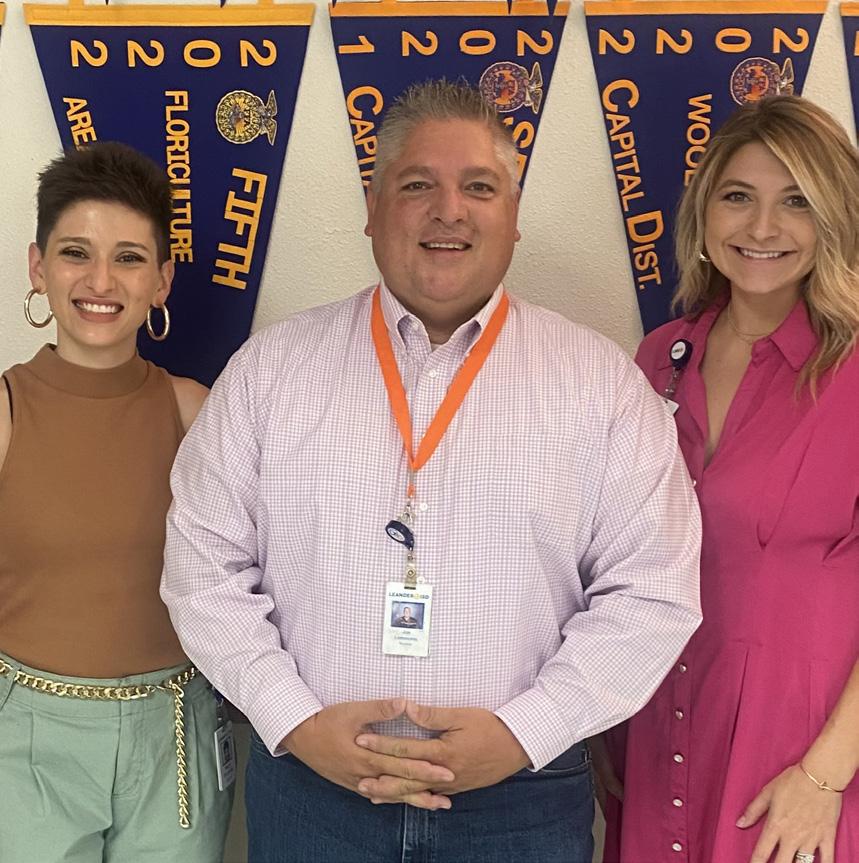
TENURE: 9 YEARS
Those of you that know him love him- Joe Lemmons. He is one of the main reasons I teach ag. As my ag teacher, I felt like he always knew the answer, had lots of patience, and had so much fun every day at work. Working alongside one of my greatest influences over the last eight years has been incredible. He's my mentor, one of my best friends, and "Uncle Joe" to my son. I don't know if Joe realizes how he changed the trajectory of my life through the classroom and FFA as a young person. Through my experiences, I was challenged to realize my potential and find my voice. I hope that as an ag teacher I have been able to do the same!
As a student, ag education taught me about the food supply and how to be an educated consumer. Just being in the classes allows for that which is fundamentally important to all people.
Beyond that, a fully immersed student in agricultural education has the potential to learn so much more. Most importantly, I believe students learn about themselves, what they're capable of, how to solve problems, and work ethic.
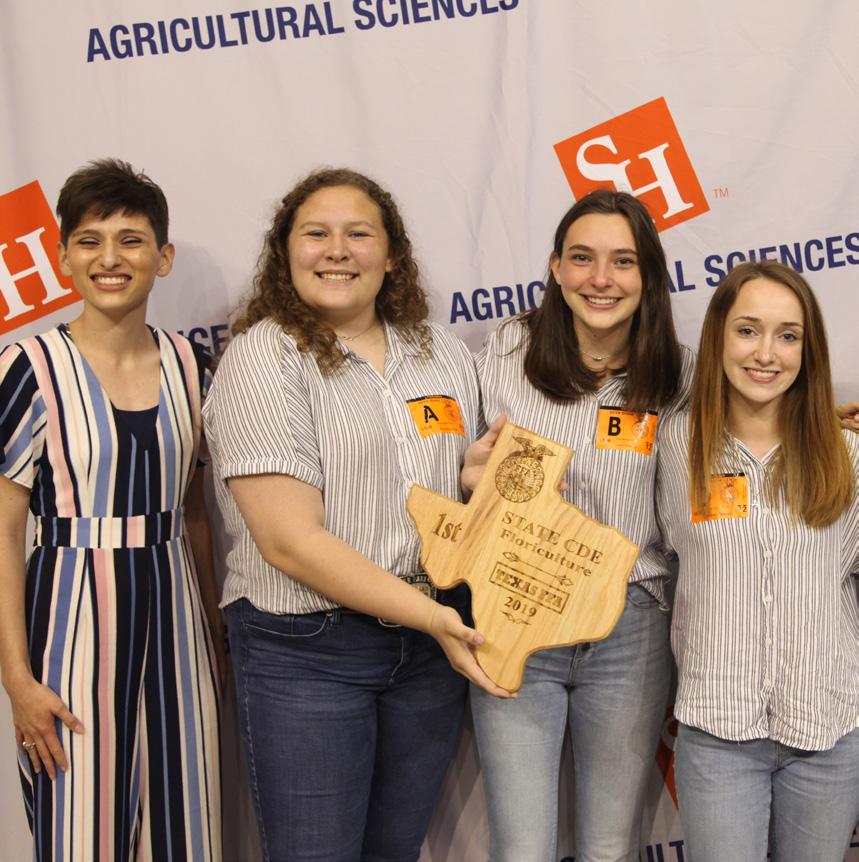
One of the things I have always tried to keep at the forefront of my mind is that everything trickles from the top down. If you want your students to be enthusiastic and have a great work ethic (or any other particular quality), you must be that example for them!
Years-long research on aquatic ecosystems has served as a successful Supervised Agricultural Experience (SAE) for Madison Perkins.
"I have spent the last three years studying aquatic ecosystems with the effects of vegetation or age on the biodiversity of a pond, followed by the effects of algae control methods," said Perkins.
The first project measured the effects of vegetation removal on a pond's biodiversity.
"Five acres of a wooded area had been cleared to build a pond. During the building process, young fish traveled through the spillway pipe of the existing pond into the muddy pit," said Perkins. "Concerned for the fish, I wondered how the amount of vegetation in a pond affected the biodiversity."
The Gilmer FFA member's project consisted of removing ten meters of vegeta-
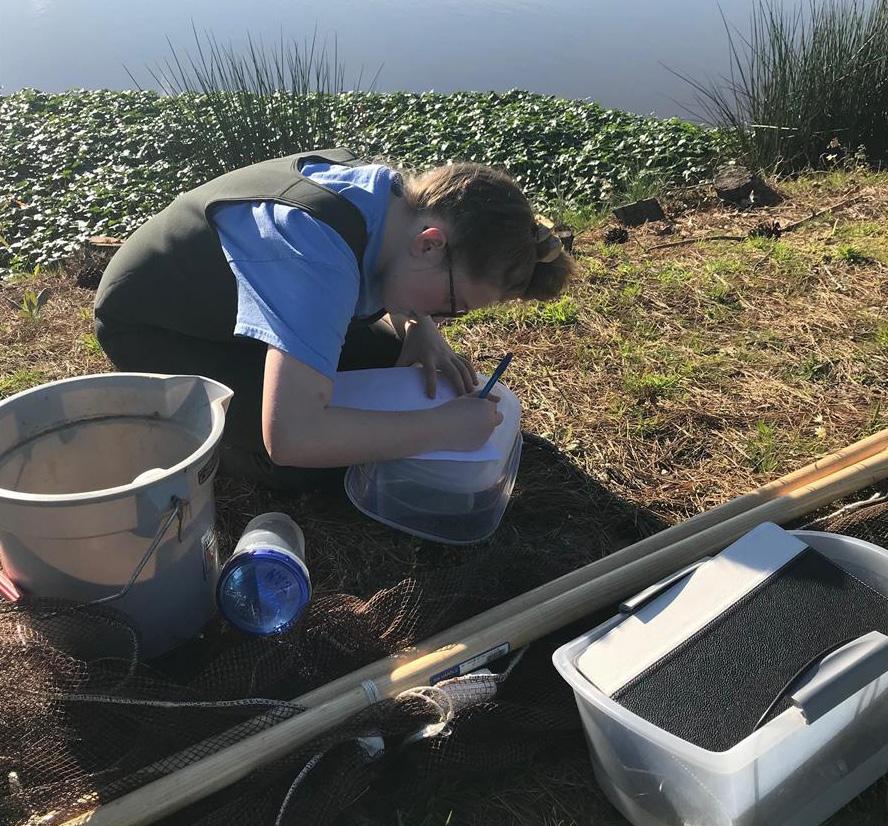
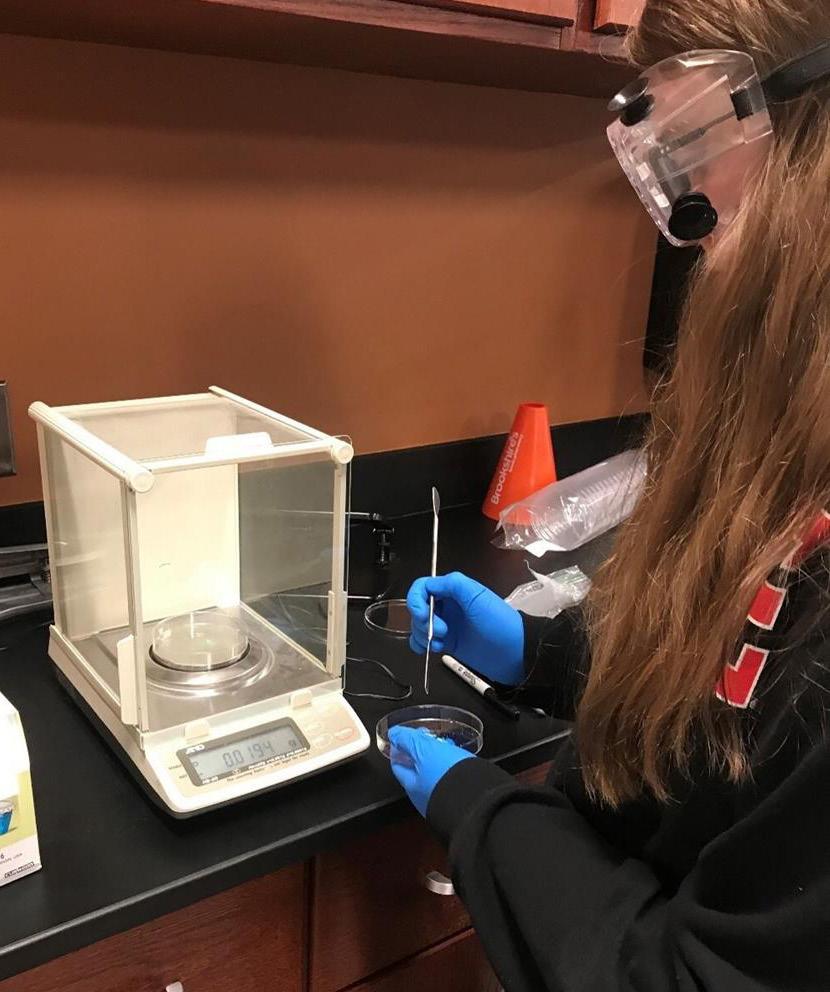
tion from one side of a pond while another ten meter section with vegetation remained intact.
"I measured the water quality and biodiversity over a six-month period to see if the disturbance altered the ecosystem," said Perkins. "Biodiversity levels for the ponds were measured using fish baskets, Hester Dendy's, a seine, a plankton net, and electrofishing."
Once she began researching in 2019, she quickly realized that she wanted to continue expanding on this topic for the next few years.
"For my second project, I wanted to compare the wa-
ter quality and biodiversity levels in that same newly built pond to the levels of a 35-year-old pond," said Perkins.


She also compared species richness, number of species, and species evenness in both research projects.


"After nothing high levels of blue/green algae in the older pond, my third-year research compared the effects of using copper sulfate, barley extract, or hay to control it," said Perkins. With the extensive time spent on research, the Texas FFA member took the insight and developed multiple presentations that was communicated to over 400 people, spanning 24 science fairs, including the National FFA Agriscience Fair. In addition, she had the opportunity to present her findings to Representative John Ratcliffe and Senator Ted Cruz in Washington DC.
Perkin's successful SAE project was recognized as the Star Lone Star in Production at the 2022 Texas FFA State Convention.
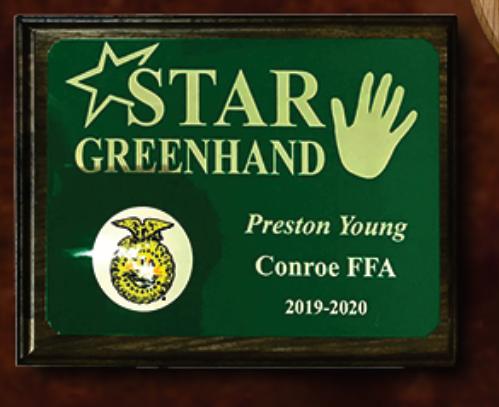






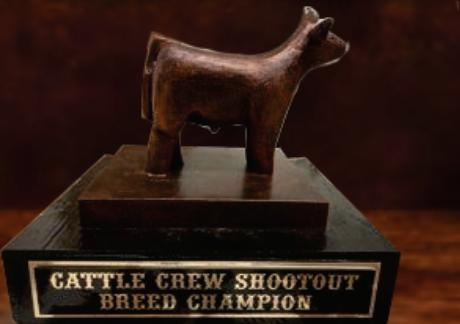




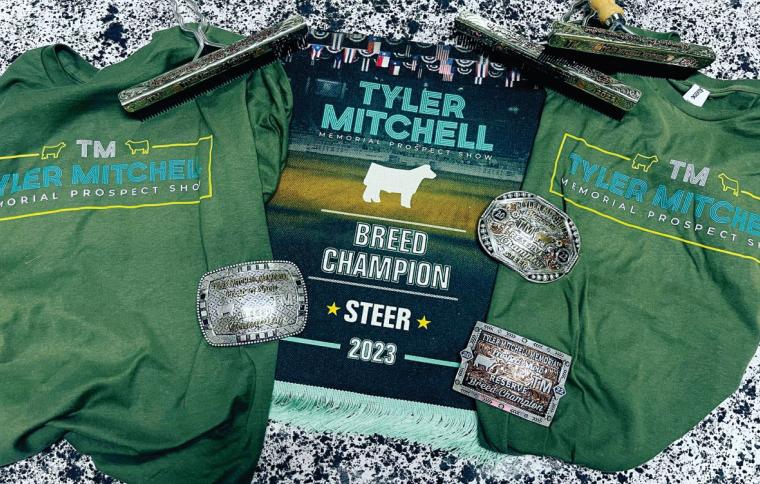

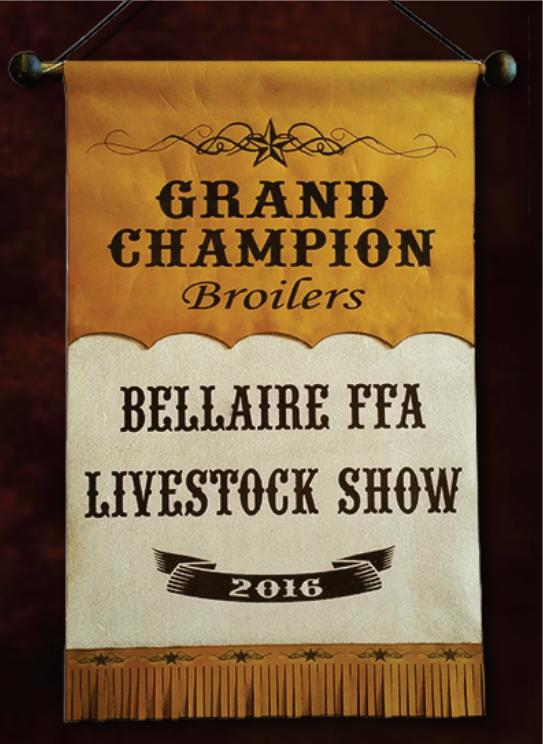

Abrush with injury and a passion for animals paved the path for Riley Arrington's successful Supervised Agricultural Experience (SAE).
"I have a great love of caring for animals, so naturally, my career goal is to be an Animal Rehabilitation Specialist," said Arrington. I am able to help them using noninvasive technology."
The Burnet FFA member learned about MagnaWave therapy as a solution to one of her horses' medical issues and then her injury.
"My mare, Lucy, started producing abscesses for several months," said Arrington. "We called on Valinda Bailey, a top technician for MagnaWave, to treat her. I saw how successful the MagnaWave treatment was on Lucy. When I broke my arm, Valinda was the first person I called."
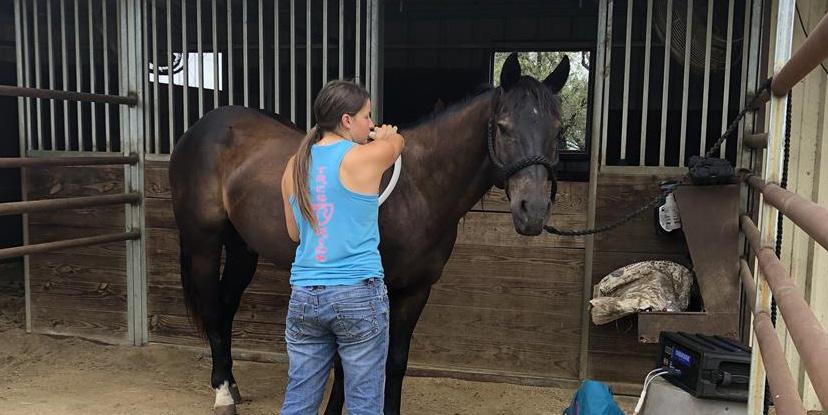
Arrington also credits her Livestock Production class with improving her animal
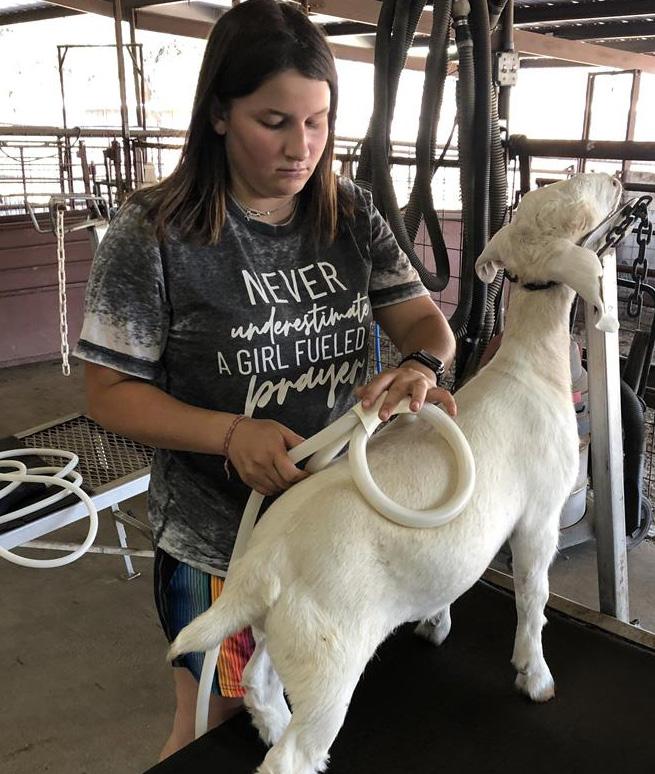
anatomy and behaviors knowledge beyond her MagnaWave certification.
"I completed the online training for horses, but I now understand the anatomy of sheep, goats, swine, and cattle, and I can better understand the treatment practices used in the training videos," said Arrington. "I can maximize my results on show animals which have helped increase my clientele."
As her accomplishments in treating local horses and livestock have grown, so has her clientele.
"To [my clientele], I had to improve my business management skills," said Arrington. "My agriculture class taught me the importance of starting and running a business efficiently and effectively, along with my mom's advice to always provide outstanding customer service. A satisfied customer is a returning customer, and they will support you by word-of-mouth advertisement."
Arrington's experience operating her MagnaWave PEMF business has taught her the importance of a supportive professional network.
"As a small business owner, I have learned about the impact one person can have," said Arrington. "I have had the opportunity to meet so many people who helped me with training and increased my knowledge of ways to run a small business over the last year and a half. Each person has made a difference in how I run my business, from how to use social media to promote my business appropriately to where to get velcro zip ties to hold my rings together."
Through these connections, she has learned skills that benefit her business and beyond.
"I've also learned how to communicate clearly and in a positive manner with my customers. Good customer service is vital for small businesses as your best form of advertisement is word of mouth."
Arrington's successful SAE project was recognized as the Star Chapter in Agribusiness at the 2022 Texas FFA State Convention.
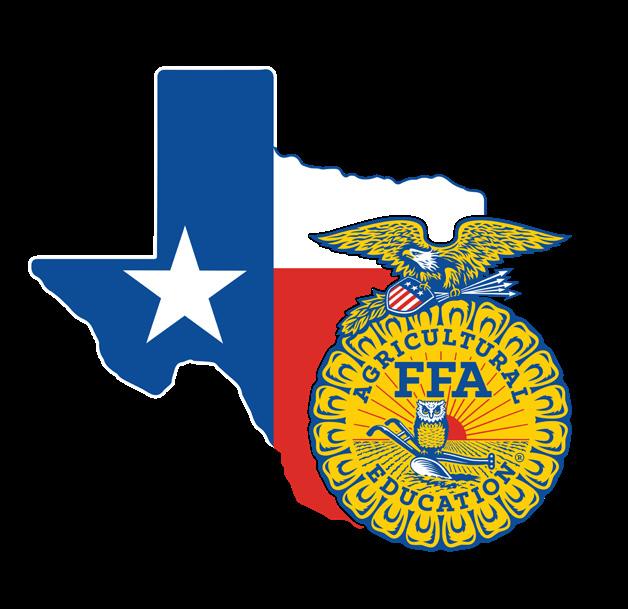
"Being fortunate enough to attend the International Production and Processing Expo in Atlanta, Georgia, earlier this year was an experience my fellow FFA members and I will not quickly forget. Being on the Food Science and Technology CDE team, we were so excited to learn more about the equipment used to get food from the farm to the table. After meeting with representatives from Cargill and Pilgrims, we were educated on the vast number of career opportunities they offer worldwide. As we walked around the trade show, we could see exactly how each piece of equipment operated and how it plays a vital role in getting food to consumers.
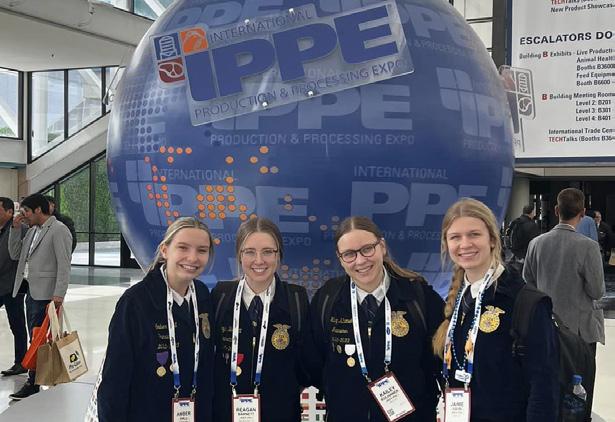
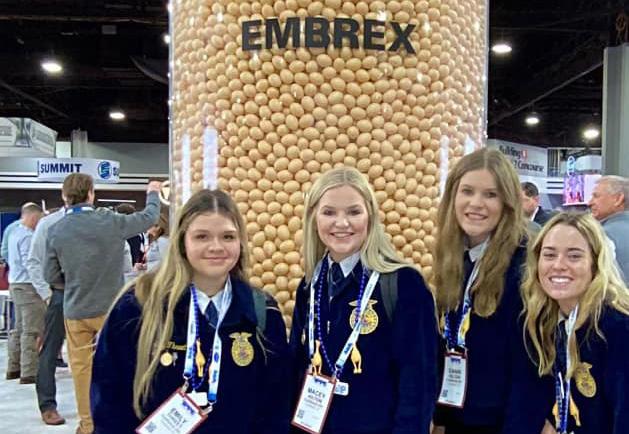
I cannot thank everyone who made this opportunity available to us because it opened my mind to choosing a career path in the production industry. Without this expereince, I may have never gained interest for this career path."
- Macey Hilton, Florence FFA

The Agriculture Teachers Association of Texas Hall of Fame exists to recognize and honor agricultural science teachers whose careers, achievements, and contributions stand exemplary. Inductees are known as well-rounded professionals that have proven their success with FFA activities, in the classroom, as well as community involvement. They have proven their desire to provide students with opportunities for premier leadership, personal growth and career success over a significant period of time.







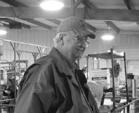




































































As an educator, I am sure this resonates with you. Like many in the education industry, you probably consider yourself a lifelong learner. After all, agricultural science teachers are in an ever-changing world and constantly seek continuous education to best prepare students for the working world.
Agriculture Education is built to support the building of lifelong learners. Here are some strategies that can aid in developing lifelong learning skills for students.
First is student-centered learning. This is familiar to the agriculture science classroom as ag education encourages students to take the lead on their learning preferences with individualized experiences. Teachers can implement student-centered learning in various ways, including group work emphasizing group discussions. Center learning on students' lived experiences as well as the why. Being clear on how information connects to their world helps students root interest as well as value to the lesson.
The second is inquiry-based learning. Everyone has heard this phrase, but implementing it is easier than it sounds. In short, having students observe, question, investigate, conclude, and discuss. Inquiry-based structures have a lot of flexibility. We tend to visualize this method only in science-based lessons; however, the inquiry-based approach can be implemented in any lesson and subject. This method fosters engagement with the material, critical thinking, curiosity, and ownership of their learning.
You can use this QR code to access an inquiry-based worksheet that can be used


in any subject with any video. This is an example of how easy it is to incorporate inquiry-based as well as student-centered learning.
Next, encourage learning outside of the classroom. Lucky for agricultural science education, there are two avenues that should be used to accomplish this. Encourage students to get involved in the many opportunities of FFA. With opportunities expanding yearly, there is always an activity that ties in with the course you teach. Second, encourage a hands-on Supervised Agriculture Experience.
Lastly, build students' confidence in the classroom. Creating an environment that strengthens confidence is as easy as breaking tasks into more obtainable goals. In doing this, students see incremental progress in mastering a small concept or improving a skill.
We have four years to prepare a student for their career. The reality is that much of what is taught will evolve and become outdated by the time our student makes it to their career. Therefore it is not what we teach but how; to encourage not the retention of information but rather the skill of lifelong learning.






As a fourth-generation cattleman, Jennifer Mask has set the goal of growing her Supervised Agriculture Experience into a thriving cattle operation and, in turn, selling genetics worldwide.


Growing up with both parents trained in bovine artificial insemination, Mask wanted to follow in their footsteps.
"It was an important goal for me to learn how to artificially inseminate cattle," said Mask. "Using AI allows me to be able to select bulls with appropriate genetics and EPDs to enhance my cattle operation."
The Franklin FFA member believes her abilities are improving and plans to continue the practice.
"Learning the skill has enhanced my cattle operation," said Mask. "I have learned that it takes time and patience to complete my goal."
She believes that agriculturists' most significant responsibility is to care for their stock humanely.
"One role in my SAEs that I take very seriously is the daily feeding schedule," said Mask. "To obtain optimal growth and performance, your projects need the correct nutrition consistently each day, including feeding times."


From an early age, her parents have taught her to be a problem solver and hard worker.
"I have learned from my experiences so far that it takes a village to be successful," said Mask. "I have been blessed by many great mentors and supporters that help push me in everything I do."
Mask's successful SAE project was recognized as the Star Greenhand in Production at the 2022 Texas FFA State Convention.
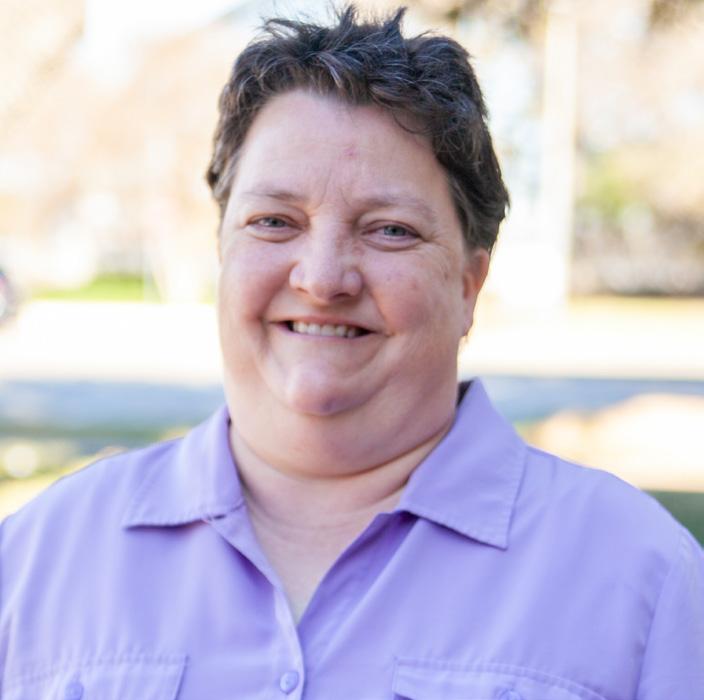 BY: LYNITA FOSTER PRESIDENT OF THE AGRICULTURE TEACHERS ASSOCIATION OF TEXAS AND MADISONVILLE HIGH SCHOOL AGRICULTURE SCIENCE TEACHER
BY: LYNITA FOSTER PRESIDENT OF THE AGRICULTURE TEACHERS ASSOCIATION OF TEXAS AND MADISONVILLE HIGH SCHOOL AGRICULTURE SCIENCE TEACHER
We did it! I expect every ag teacher feels a sense of relief to have the school year reach completion. I hope you feel proud of what you did.
During the last ten months, you have invested your heart, time, wisdom, and love into the students in your care. You have positively influenced their lives and their futures. If that is not a noble cause, I don’t know what is. But, perhaps, the most beautiful part of the achievements of this school year remains to be written.
The students you touched will move forward with their lives, using the knowledge gained from you to work smarter, be more prepared, to invest in others, and to find fulfillment. Best of all, they will use the most valuable skill you helped them obtain – how to learn.
Even the best teachers have a limited amount of time with their students. At some point, the pupil will leave the teacher’s direct influence. This is why one of the best things we can do is to nourish in our students a healthy sense of inquisitiveness. If we encourage our students to seek wisdom constantly, we have given them something of great worth. Gordon B. Hinckley said, “There are few things more pathetic than those who have lost their curiosity and sense of adventure, and who no longer care to learn.”
Lifelong learning is, of course, not just something to pass along to our students. It is something for us to practice in our own lives every single day.
Bobbie is a lady I became acquainted with
at church. When our congregation needed someone to play the piano, Bobbie stepped up. She was in her 70’s and had not previously played this instrument. However, she jumped in with enthusiasm and became quite proficient. Of course, there was bad chords and some mishaps along the way, but she never gave up. She was a wonderful example of lifelong learning for all of us.
I recently accepted an invitation from a friend to attend a weekly Spanish class. I will be honest, I wasn’t too excited about the idea, but I couldn’t tell my friend no. That was four months ago, and my conversational Spanish is on the level of a preschooler at best. But the speed of my progress is not the point here. Challenging myself to grow in a new direction has been surprisingly refreshing and has reminded me that it can be fun to learn something new.
I enjoy many things about being a teacher, but one of the top benefits is that there are always opportunities to learn. This is not a job of mindless repetition. Every day holds something unique. We get to travel the state, see new sites and meet new people. We get to interact with dozens of stakehol-
“LIFELONG LEARNING IS, OF COURSE, NOT JUST SOMETHING TO PASS ALONG TO OUR STUDENTS. IT IS SOMETHING FOR US TO PRACTICE IN OUR OWN LIVES EVERY SINGLE DAY. ”
ders who share perspectives from a myriad of agricultural industries. We get to interact with ag teachers across Texas, comparing notes and sharing tricks and tips. We get to interact with administrators, colleagues, cafeteria workers, maintenance staff, etc., who all have lessons to share.
And we interact with our students – who often teach us more than we teach them. I can’t think of many other occupations that cater so well to lifelong learners.
During the summer, we have multiple opportunities to invest in our own personal growth. Universities offer several outstanding summer clinics designed for ag teachers. I would also highly encourage you to attend the ATAT Conference in July. The workshop offerings are diverse and of high quality. At this event, you can also make your voice heard. Multiple committees meet to provide teacher input on needed changes on LDEs, CDEs, scholarships, stock shows, etc. By serving on these committees or by providing perspective to your area representatives, you can help effect positive changes. You should also feel free to visit with your ATAT board members. One of their main roles is to bring your concerns forward so that they can be addressed.
The ATAT, FFA, and Foundation board members and staff are constantly seeking to be lifelong learners, and they can learn how to better serve by learning from you.
On a personal note, I appreciate your allowing me to be your ATAT president this year. I love this profession and rate ag teachers among my best friends, mentors, and heroes. I appreciate your encouragement and support, and I will always cherish this experience as a valuable life lesson.
Let me conclude with a final quote from Henry Ford. “Anyone who stops learning is old, whether at twenty or eighty. Anyone who keeps learning stays young.”
So even though I will still get a sore back and cannot see that fine print without those dad gum reading glasses, I plan to drink from the fountain of youth regularly. I hope you will too, as we all work to be and to help our students be lifelong learners.
June 2004
By: Dennis Ellebracht, VATAT Executive DirectorWe have just completed another school year, or for some, this could have been the completion of your first year of teaching. The time has come to utilize your time without students to prepare for next year.
Keeping the administration informed of all your activities and work schedule is very good public relations. Many administrators do not realize what an agriculture science teacher does during the summer months. Some type of summer plan would keep them informed of your location during those summer months.
This is a good time for your project selections, supervision of projects, prospective student visitations, organizing your agriculture mechanics laboratory and class activities, leadership camps, and state FFA convention and many other activities.
Learning for an agricultural science teacher comes in many different forms and fashions. Opportunities to grow and learn appear in many forms, including learning from students during classroom discussions. As stated by Albert Einstein, "Intellectual growth should commence at birth and cease only at death."
We should always continue wanting and desiring to better ourselves as teachers and mentors for our students. As teachers, we should take advantage of the learning opportunities that present themselves.
"Those people who develop the ability to continuously acquire new and better forms of knowledge that they can apply to their work and to their lives will be the movers and shakers in our society for the indefinite future," states Brian Tracy.
Many teachers do not believe they know everything when they leave college. Most of what I taught was probably not part of my curriculum, but it provided me with a basic understanding of what concepts may be important. My classroom philosophy was that I only needed to be one day ahead of my students. This may not work in today's world when a student can google what you say and find more information in an instant! We probably need to be ahead of them by a week or a month now.
As Peter Druckerc states "We now accept that learning is a lifelong process of kee-
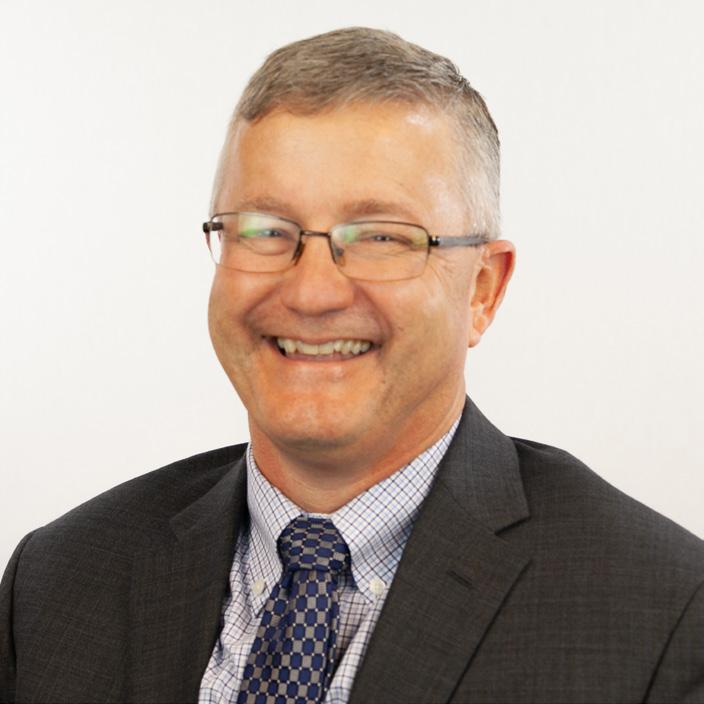
ping abreast of change. And the most pressing task is to teach people how to learn."
As teachers, we understand what students are learning today may be outdated by the time they get to their careers. We ultimately are preparing students for careers that do not exist yet. We must teach them to adapt and use the previously learned skills to build upon and be prepared for the future.
As teachers of an ever-changing industry, we must love what we teach and stay abreast of the subject matter. As Julia Child said, "You'll never know everything about anything, especially something you love." We should always look for important new information we can share with our students.
As an association, we hope to continue improving our offerings to our members and ensure we are keeping you up to date with what is happening in our agricultural education world. Remember, as Henry Ford said, "Anyone who stops learning is old, at twenty or eighty. Anyone who keeps learning stays young."
“WE SHOULD ALWAYS CONTINUE WANTING AND DESIRING TO BETTER OURSELVES AS TEACHERS AND MENTORS FOR OUR STUDENTS.”
TASKS YOUR FUTURE SELF WILL THANK YOU FOR BY: MICHELLE VASBINDER, ATAT
Refect - Take a little time to reflect on this past school year. List out what went right, what went wrong, and what would make your life easier. This gives you an action item list you can tend to throughout summer. Nothing changes or improves without a little reflection.
Curriculum Building - I am sure the last thing you want to think about is lesson plans! However, now is the time to set your school life up. It is an amazing feeling to have your lessons in order so in August you walk in that door prepared. We know how many things pop up in a single school day, and by having your classroom plans set you will eliminate a magnitude of stress.
Start by editing your scope and sequence, listing out lessons that need to be added to and built. Take a few days to reach out to teachers at neighboring schools and collaborate on your lessons. The best planning I have ever done was when surrounded by my neighboring College Station gals.
Professional Development Planning - Think about what kind of professional development you can use. Don’t wait until ATAT Conference to decide. Plan ahead! My first few years of teaching I missed out on awesome professional development opportunities I could have greatly used because I simply didn't realize I needed it. Invest in yourself throughout the summer, not just one week of it.
Rest - You made it! Though our jobs really never end, June should be a month of rest and relaxation. Take some time for yourself to do whatever rejuvenates you. Burnout is real, but can be prevented. Recharge your batteries so come August you are not only rested and ready, but pumped about the new school year.
I hope you spend time resting and recharging, and I hope this helps you prepare for another year in the life of an ag teacher.

Perspective allows us to understand situations from other viewpoints, to consider beliefs that may be different from our own and experiences that differ significantly from those we have had. Perspective allows us to increase our empathy while reducing bias, judgment, and the possibility of conflict. So I'd like to offer my perspective on careers within agricultural education.
From my perspective, we are blessed to work in a field that, though busy and overwhelming at times, offers us the opportunity to promote the industry that single handily sustains the population. We get to teach courses with unlimited potential for engagement and hands-on learning. We get to incorporate competition and life skills into our interactions with students and identify and encourage the next generation of leaders.
Brian Herbert once said, "The capacity to learn is a gift, the ability to learn is a skill, and the willingness to learn is a choice."
The important thing is never to stop questioning. Curiosity has its reason for existing.
Agricultural science education is plagued with jobs requiring extensive hours, dedication, and even more passion for our work. It's necessary to remind ourselves of the positive aspects of this career, and I hope this article reminds you of the blessings these jobs provide us.
When you think about being a lifelong learner, you think reading might be necessary, professional development might be advantageous, and being open to the thoughts and ideals of others might open your eyes to a new way of thinking. When we graduate high school, we have a certain set of knowledge and skills, and college provides even more, but the experience we get from this job offers so much more!
How blessed are we that we not only get to challenge students to be lifelong learners and open themselves up to new experiences and skills, but we too get to learn because of the students we work with? Think about it; you go into the classroom knowing exactly what teams you want to train and what SAEs you want to supervise. Then you work with students who have something different in mind. A teacher who teaches all floral design and wants to train a Floral CDE team and a quiz team can expand their reach to be able to train an entomology
“FROM MY PERSPECTIVE, WE ARE BLESSED TO WORK IN A FIELD THAT, THOUGH BUSY AND OVERWHELMING AT TIMES, OFFERS US THE OPPORTUNITY TO PROMOTE THE INDUSTRY THAT SINGLE HANDILY SUSTAINS THE POPULATION."
team or even a vet med team.
Administration comes to you in May and tells you that you are teaching a section of Range Ecology Management due to a high enrollment level. It's not something you've taught before and certainly wasn't part of your college degree plan, but here you are presented with an opportunity to learn and impact students in another way.

You are teaching a Practicum Course for next year and have several students doing internships you'll supervise. Not only do you get to hold them accountable and teach employability skills, but you also get the opportunity to learn about the various aspects of their jobs, from working at a vet clinic, interning with a local cattle rancher, or working for a local custom fabrication shop.
I would rather be a learn-it-all than a know-it-all.
The mind is a funny thing. Once we have accomplished what society considers a

full life, we often stop learning, assuming there's really no point. I hope that I am always curious enough to want to seek adventures in the media I consume, the books I read, the travel I embark on, and the tasks that fill my day. I hope that I will also appreciate a deep conversation with a colleague or value someone challenging my thoughts or ideas because, through these conversations, I continue to learn.
I'm fortunate to have the opportunity to work in a job that presents us constantly with opportunities to evaluate our programs while continuing to learn new methodologies and practices that may help us increase the rigor and educational value of the experiences we offer our members. I hope that you all see your careers in the same light!
May we all focus on modeling this perspective to our younger generations and represent to them the opportunities there are to learn and grow through agricultural education.
Our state and country are blessed with three vital and renewable resources: youth, agriculture, and leadership. More than 244,000 students in Texas public schools are learning about food, food production, food security, and sustainability.
Along with food production, students are also establishing core value development of caring for our animals, crops, and natural resources. Knowing our students are learning about agricultural science education and leadership development through the Texas FFA ensures the sustainability of our state's leadership and stewardship of our natural resources.
Many times, people ask, "What separates agricultural education/FFA students from their peers?" It is important to note there are many great opportunities for students to connect through their schools, i.e., athletics, fine arts, academic clubs, and many other community-based organizations. However, our program provides a unique experience that creates a lasting core value.
Students in agriculture know that if they don't do their job, something dies. Animals and crops must be fed, watered, and cared for, and failure to do so results in a loss that can cripple an economy or, even far worst, loss of a society.
Agricultural pursuits ensure students are

developing a vital workforce tool - work ethic. Getting up early to feed or staying up late to water an animal promotes a unique ability to take responsibility.
With the many moving parts of production agriculture, learning that something will go differently than planned will take little time. As work ethic develops, so are critical thinking and problem-solving skills. Putting in the hard work and effort will also ensure a bountiful harvest.
A bountiful harvest is the result of successful production practices. When students learn the importance of "best practices" in food production, they also practice ethical food production. Margins created by best practices ensure our food supply, supply chain, and consumer demands are being met.
Our harvest creates a stronger Texas economy. By having young people involved in agriculture, we are purposely growing
“BY HAVING YOUNG PEOPLE INVOLVED IN AGRICULTURE, WE ARE PURPOSELY GROWING OUR STATE'S ECONOMY, AND OUR STUDENTS ARE GROWING INTO THE LEADERS WHO WILL SUSTAIN OUR STATE'S SUCCESS."
"WHEN TILLAGE BEGINS, OTHER ARTS FOLLOW. THE FARMERS, THEREFORE, ARE THE FOUNDERS OF HUMAN CIVILIZATION." - DANIEL WEBSTER
our state's economy, and our students are growing into the leaders who will sustain our state's success.
When world-renown hockey player Wayne Gretzky was asked what made him such a great player, he responded, "I skate to where the puck is going to be, not where it has been." When it comes to young people, that is where the future is headed.
Our world will need 65 – 70% more food in 25 years. However, we also know we will not have 65 – 70% more land and water resources to grow the food we need to feed a hungry world. We must have incredible minds to help find proven and sustainable methods to meet our food needs. The demand for more food provides an opportunity for students who may pursue a career in agriculture. Supporting the students of agriculture and those developing their skills through the FFA will provide opportunities for our great state.
The FFA Motto contains some distinct in
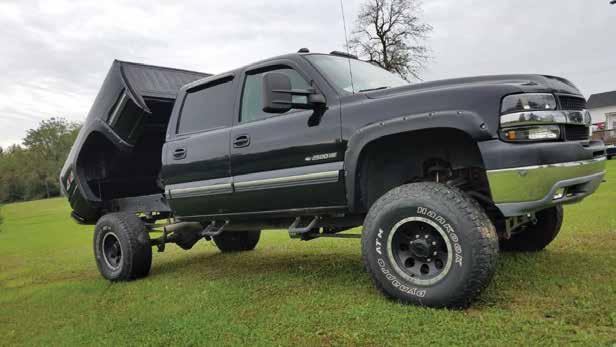
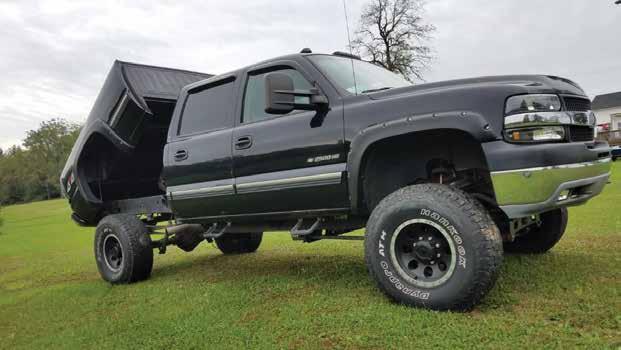
sight that provides timeless direction to leadership.

Agriculture definitely teaches students to take initiative, learn from their experiences, and provide a way of life. Maybe one of the keys to effective leadership is found in the last line … Living to Serve. By pursuing a career in agriculture, they provide sustenance to a hungry world, feed our state's economy, and allow us to grow better leaders through the Texas FFA.
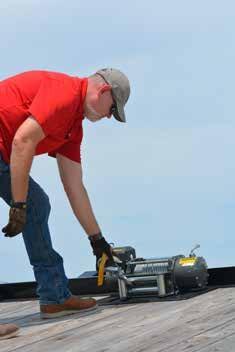
When thinking about our world's food needs and security, it is comforting to know that we have a program here in the Lone Star state to grow the future we want. We are growing our state's agricultural resources and the young people through the FFA who will learn today and lead tomorrow.

W e a r e e x c i t e d a n d h o n o r e d t o b e h o s t i n g o u r i n a u g u r a l L E A D i n g a L e g a c y
S o c i a l o n t h e e v e n i n g o f M o n d a y J u l y 2 4 t h a t 6 : 3 0 P . M .

O u r o b j e c t i v e i s t o d p r o m o t e l e a d e r s h i p
p r o g r a m s a n d s c h o p p o r t u n i t i e s f o r o u r T e x a s F F A M e m b e r s a n d a g r i c u l t u r a l s
n d h o n o r e d t o b e h o s t i n g o u r i n a u g u r a l L E A D i n g a L e g a c y
S o c i a l o n t h e e v e n i n g o f M o n d a y , J u l y 2 4 t h a t 6 : 3 0 P . M .

L i v e A u c t i o n
O u r o b j e c t i v e i s t o r a i s e f u n d s t o s u p p o r t a n d p r o m o t e l e a d e r s h i p p r o g r a m s a n d s c h o l a r s h i p o p p o r t u n i t i e s f o r o u r T e x a s F F A M e m b e r s a n d a g r i c u l t u r a l s c i e n c e t e a c h e r s .

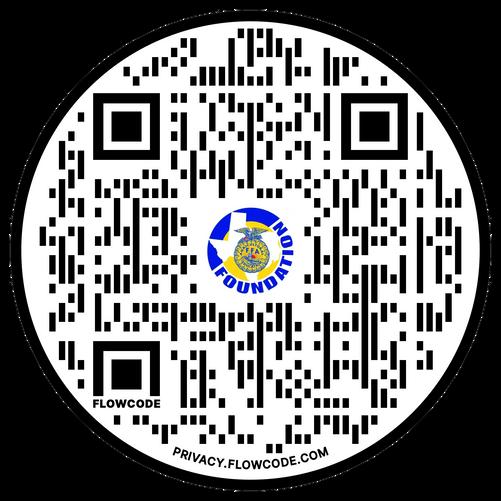

O n l i n e A u c t i o n
W h a t s h o u l d I e x p e c t a t
G a m e s a n d R a f f l e s
K u b o t a U T V R a f f l e
C a u s a l D r e s s
F U N , F o o d , F e l l o w s h i p - a l l f o r a g o o d c a u s e !
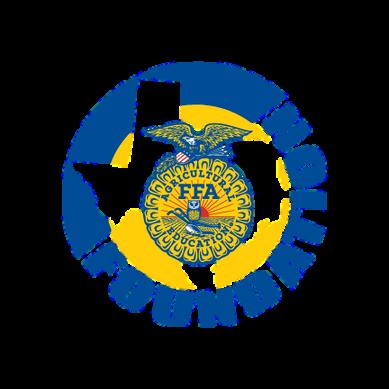
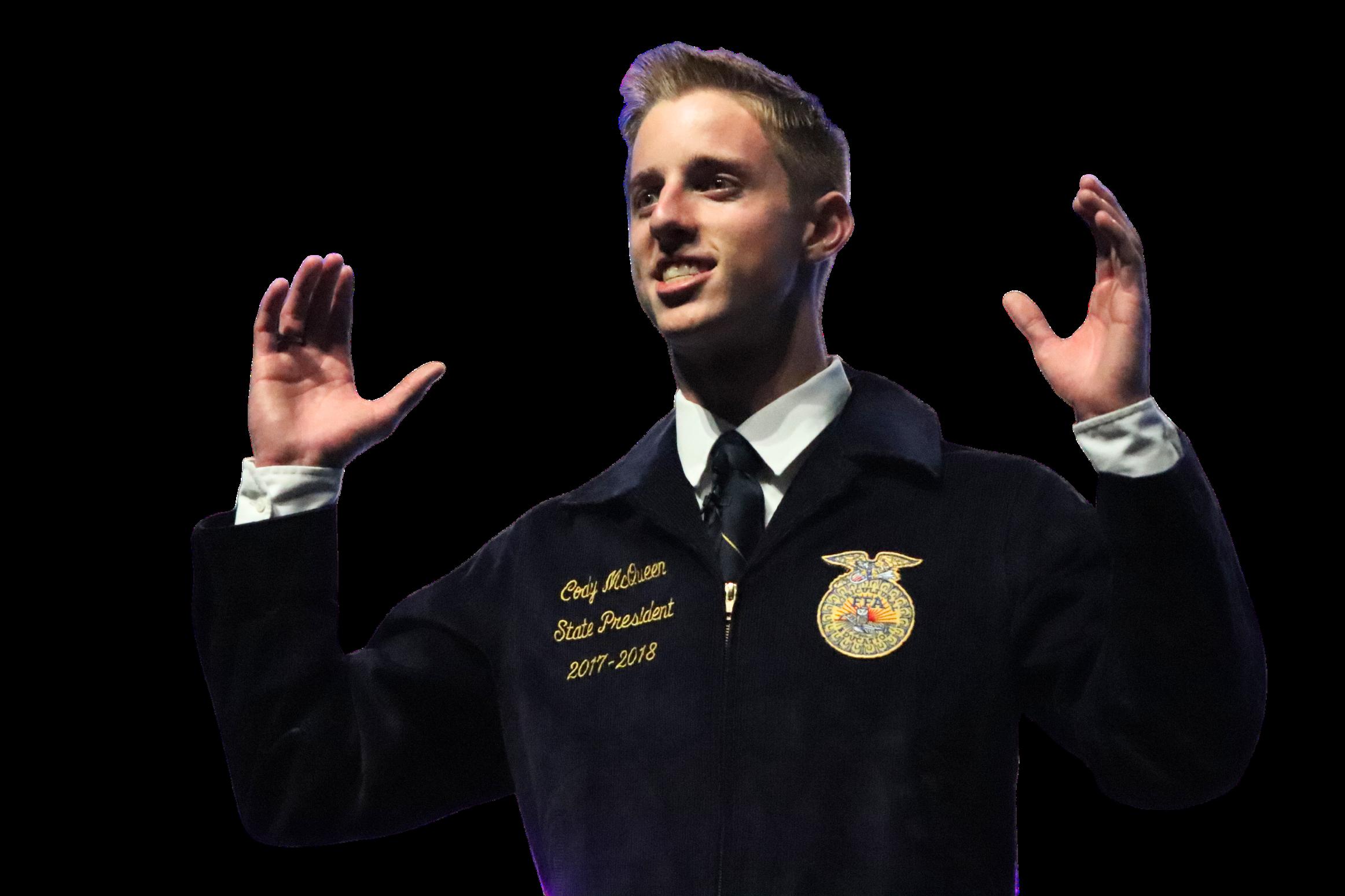

Iremember hearing the poem, “The Touch of the Master's Hand” by Myra Brooks Welch over my mother's radio as a young boy. It was Walter Brennan's recognizable voice with the accompaniment of the Johnny Mann singers. Although it was released in 1962, the year before I was born, the words in this piece tell a strong story. How does it relate to your life? Perhaps, you have made a change in one of your student's lives. You saw their worth. You picked them up and showed them their value.
Just as the poem speaks of an auction, we are having one as well!
Were you aware that the Texas FFA Alumni has an auction on Thursday night during the Texas FFA Convention? This is how we have raised funds to provide grants, scholarships, and support to the ATAT, and have teamed with Texas FFA's PSO Alumni to recognize our retiring officers. There is something for everyone at the auction. We hope to see you there! Come by the Alumni booth to check out the items or learn how you can get involved in the Texas FFA Alumni.
'TWAS BATTERED AND SCARRED, AND THE AUCTIONEER THOUGHT IT SCARCELY WORTH HIS WHILE, TO WASTE HIS TIME ON THE OLD VIOLIN. BUT HE HELD IT UP WITH A SMILE, "WHAT AM I BID, GOOD FRIENDS," HE CRIED. "WHO'LL START THE BIDDING FOR ME?
ONE DOLLAR! ONLY ONE! AND WHO'LL MAKE IT TWO? TWO DOLLARS, ONCE. AND THREE!
THREE DOLLARS ONCE. AND THREE DOLLARS TWICE. AND GOING, AND GOING, "BUT NO... FROM THE BACK OF THE ROOM A GRAY-HAIRED MAN CAME FORWARD AND PICKED UP THE BOW. AND WIPING THE DUST FROM THE OLD VIOLIN AND TIGHTENING THE LOOSE STRINGS, HE PLAYED A MELODY PURE AND SWEET AS CAROLING ANGELS SING. THE MUSIC CEASED AND THE AUCTIONEER WITH A VOICE THAT WAS QUIET AND LOW, SAID "WHAT AM I BID FOR THE OLD VIOLIN?" AS HE HELD IT UP WITH THE BOW.
"ONE THOUSAND DOLLARS, AND WHO'LL MAKE IT TWO? TWO THOUSAND DOLLARS, AND THREE!
THREE THOUSAND, ONCE, AND THREE THOUSAND TWICE, AND GOING, AND GOING, AND GONE!" SAID HE. THE PEOPLE CHEERED, BUT SOME OF THEM CRIED, "WE DON'T QUITE UNDERSTAND WHAT CHANGED ITS WORTH." SWIFT CAME THE REPLY. "TWAS THE TOUCH OF THE MASTER'S HAND." AND MANY A MAN WITH LIFE OUT OF TUNE AND BATTERED AND SCARRED WITH SIN, IS AUCTIONED CHEAP TO THE THOUGHTLESS CROWD, MUCH LIKE THE OLD VIOLIN. A MESS OF POTTAGE, A GLASS OF WINE, A GAME, AND HE TRAVELS ON. HE'S GOING ONCE, AND GOING TWICE, AND GOING, AND ALMOST GONE. BUT THE MASTER COMES AND THE THOUGHTLESS CROWD NEVER CAN QUITE UNDERSTAND THE WORTH OF A SOUL, AND THE CHANGE THAT IS WROUGHT, BY THE TOUCH OF THE MASTER'S HAND.
“JUST AS THE POEM SPEAKS OF AN AUCTION, WE ARE HAVING ONE AS WELL!”
American Meat Science Association
Culinary Meat Selection & Cookery
Approved for the Culinary Arts & Food Science and Technology Pathways - IBC ID: 978
American Meat Science Association
Food Safety & Science
Approved for the Culinary Arts & Food Science and Technology Pathways - IBC ID: 994
BASF
Plant Science
Approved for the Plant Science Pathway
IBC ID: 951
Benz School of Floral Design
Principles of Floral Design
Approved for the Plant Science Pathway
IBC ID: 1033
Ducks Unlimited

Ecology Conservation & Management
Approved for the Environmental and Natural Resources Pathway
IBC ID: 1070
Elanco
Fundamentals of Animal Science
Approved for the Animal Science Pathway
IBC ID: 986
Elanco
Approved for the Animal Science Pathway
IBC ID: 987
Equipment & Engine Training Council
Principles of Small Engine Technology
Approved for the Automotive Pathway
IBC ID: 1034
National Horse Judging Team Coaches’ Association
Equine Management & Evaluation
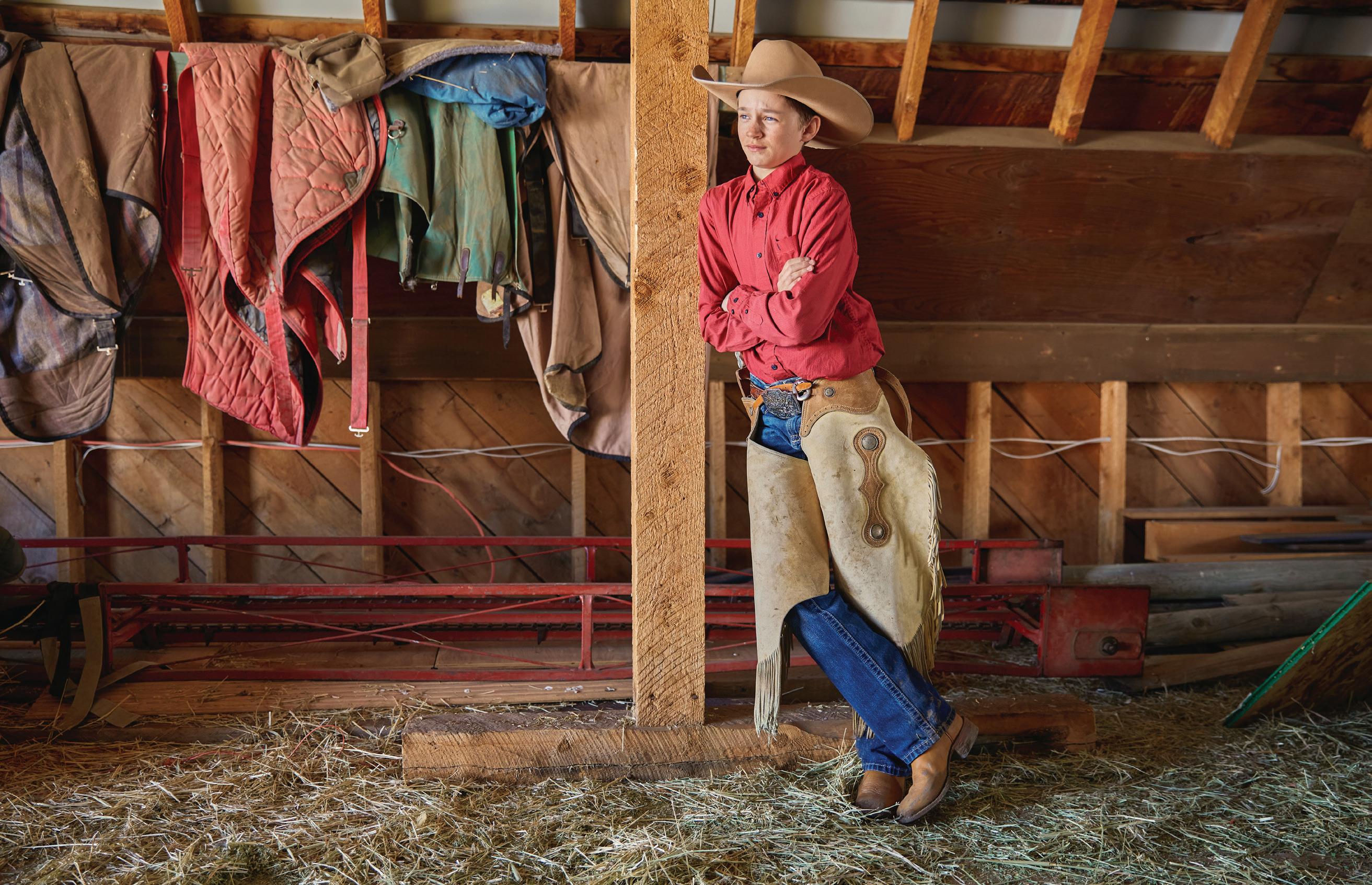
Approved for the Animal Science Pathway
IBC ID: 990
The State Association of Young Farmers of Texas aims to provide educational programs designed to meet the needs of men and women with a vested interest in agriculture. Learning is not limited to the young; it is not limited to students of higher education, it is a part of life, a crucial part of life. Texas Young Farmers is dedicated to educating our members and the communities we serve through programs that promote leadership, community enrichment and family activities, just to name a few.
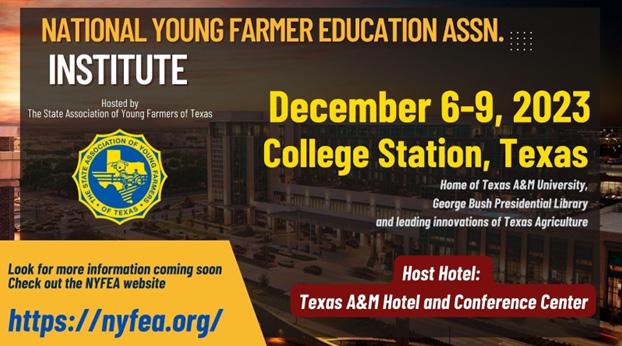
While preparing to write this article, I reached out to a few people for their thoughts and Kristie Farrer, Rockwall FFA Advisor said it best, “The world of agriculture has been around for years. One thing about agriculture is that we are always learning and always evolving to suit the world around us. From a horse pulling a plow through
the field to having GPS systems in tractors, agriculture has come a long way. This is due to the lifelong learning associated with agriculture. We are constantly learning new ways to be more productive in all aspects of the agriculture industry. Through agricultural education, we can teach the next generation how to be open to learning new technology and how to handle any adversities that come our way. If we, as agriculturalists, are unwilling to continue to learn, we will not prosper in the ways needed to be productive with our time and money. Lifelong learning is essential to the future of agriculture.”
To learn about educational opportunities near you, reach out to your local chapter. Please consider joining us at our National Convention, being hosted by Texas in December!
Agriculture Teachers Association of Texas Professional Development Conference
July 24 | 7:30 a.m. – 4 p.m.
Texas A&M AgriLife—The Dallas Center 17360 Coit Road, Dallas
Agricultural science teachers get to know Texas Farm Bureau resources during this one-day workshop.
Site visits and multiple presentations by sta and other experts will showcase materials teachers are encouraged to use in their classrooms available from Texas Farm Bureau and industry partners.
Registration closes July 14.
Register at texasagteachers.org. Contact TFB Educational Outreach sta at edoutreach@txfb.org or 254.751.2258 with questions.

RASHAYLA JOHNSON
LACI KEEL
MICHAEL KEITH
KELSIE KENNON
GOWER LESTER
BRITTNEY MACHADO
KAYLEE NEWBROUGH
ASHLEY NIXON
MADISON OWENS
KATHERINE PALMER
ERICA PAVLISKA
REBEKAH PEARSON
CHEYENNE PETERS
SAMANTHA PODLUCKY
CLARA PRICE
TAALOR RATCLIFF
EMILY REILEY
LACY RENO
WYATT RICKLY
ILIANA RODRIGUEZ
STERLING ROUNSAVALL
SLOAN ROWLAND
BOBBY RYNEARSON
KYNDAL SLIGH-CAMPBELL
MADISON STAAB
JAKE STEWART
KENDALL STONE
TAYLOR TRAVIS
JOURDAN TUCKER
KELLIE VICTORY
MORGAN WATERS
COURTNEY WEEKS
MEGAN WHITED
AUNNIKA WITTNER
LOBBYIST WORKING FOR INTEREST INVOLVING AGRICULTURAL SCIENCE EDUCATION AND RELATED TEACHERS
TIMELY LEGISLATIVE UPDATES CONCERNING AGRICULTURAL SCIENCE EDUCATION
ANNUAL PROFESSIONAL DEVELOPMENT CONFERENCE REGISTRATION FEE IS WAIVED
ACCESS TO LEGAL ASSISTANCE
ACCESS TO A $1 MILLION PROFESSIONAL LIABILITY INSURANCE POLICY
YEARLY SUBSCRIPTION TO THE ASSOCIATION’S QUARTERLY MAGAZINE, GROWING OUR FUTURE
ACCESS TO THE ASSOCIATION’S WEBSITE, INCLUDING THE CAREER PAGE
ACCESS TO THE ASSOCIATION’S ONLINE MEMBERSHIP DIRECTORY
ELIGIBILITY TO APPLY FOR THE ASSOCIATION’S STUDENT SCHOLARSHIP (MEMBER’S CHILDREN ONLY)
ELIGIBILITY TO APPLY FOR THE ASSOCIATION’S AWARDS AND RECOGNITION PROGRAM
ELIGIBILITY TO APPLY TO BE A PART OF THE ASSOCIATION’S PROFESSIONAL NEW TEACHER MENTORING PROGRAM
ELIGIBILITY TO PARTAKE IN THE KENNETH HUGHES LIFE INSURANCE PLAN
ACCESS TO THE ASSOCIATION’S AGRICULTURE SCIENCE TEACHERS CRISIS FUND
ACCESS TO THE VATAT CREDIT UNION
ACCESS TO A DISCOUNT AT WYNDHAM HOTELS NATIONWIDE
ACCESS TO THE AGRICULTURAL EDUCATION FORD TEXAS FFA LEADERSHIP CENTER FOR MEETINGS OR SMALL GATHERINGS
